BY MICHELLE ALDEN
The Dallas Bar Association is pleased to announce that Morrison Foerster is the kickoff donor for this year’s Equal Access to Justice Cam paign, with a generous contribu tion of $25,000. The Equal Access to Justice Campaign is the annual fundraising campaign that supports the activities of the Dallas Volun teer Attorney Program (DVAP). The firm’s gift makes it possible for DVAP to continue to provide and enhance legal aid to low-income people in Dallas, keeping the doors to the courthouse and our over all justice system open to many more people in our community.
Since 1982, DVAP has provided, recruited, and trained pro bono law yers to provide free legal aid to lowincome people in Dallas. Last year, a 13-member staff supported over 1,700 volunteers in their efforts to volunteer at legal clinics and advise and represent clients.
Morrison Foerster is a fullservice law firm with collective expertise in a wide range of prac tice areas, including business and finance, litigation, intellectual property, and regulatory practice. The firm has recently expanded into Texas with an office in Austin, in addition to their 17 other offices spanning seven countries. Mor rison Foerster lawyers have been dedicated to making a difference through pro bono for nearly three decades. From history-making class
actions to impactful individual cases and unique partnerships with innovative nonprofits and social enterprises, their lawyers around the globe are passionate about using their skills to protect human rights and to create a better future for all.
The firm’s lawyers invest time in more than 1,000 pro bono matters each year for individuals, nonprofit organizations, small businesses, and social entrepreneurs.
“We are dedicated to making a meaningful impact for the commu nities we serve through pro bono service,” said Bradley Wine, Morrison Foerster Austin Managing Partner and Litigation Department Co-Chair. “Our support of the Dal las Volunteer Attorney Program and the critical work they do for the Dallas community is a reflection of our commitment to community ser
vice and our values as a firm.”
As the pandemic is hopefully nearing its end, DVAP contin ues to assist the most vulnerable among us with their civil legal needs. One recent client, “Cassie” applied for assistance in gaining custody of her two minor siblings, “Evie” and “April.” Their mother recently died of COVID-19. Evie’s father is deceased, and April’s father is currently incarcerated and not expected to be released until 2028. Evie and April already live with Cassie and her family. Cassie wished to establish legal custody of her sisters, and attorney Joanna Grossman of SMU Dedman School of Law accepted the case for pro bono representation. Joanna filed a nonparent Suit Affecting the Par ent-Child Relationship. Due to the circumstances surrounding the bio logical fathers of each child, non parent sole managing conservator ship was granted. Cassie is thankful to be a legally recognized family and to continue caring for her sisters.
The justice gap in Dallas County is daunting. In a country based on justice for all and access to our court system, over 25 percent of Dal las County residents live near the poverty level, and 42 percent have a slim hope of being able to afford an attorney. With annual poverty incomes of $34,687 for a family of four, justice is a luxury for low- and moderate-income families.
“Morrison Foerster is committed to service, and we are proud to sup
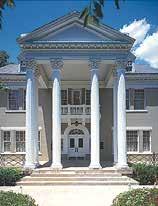
port the Dallas Volunteer Attorney Program in its vital mission to pro vide free, civil legal help to deserv ing members of the Dallas County community and beyond,” stated Mr. Wine.

The commitment of Dal las attorneys and the DBA to the Equal Access to Justice Campaign is impressive. Since 1997, the DBA and Legal Aid have joined forces to raise money for the program, with Dallas lawyers donating over $18.8 million.
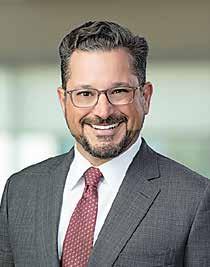
DVAP is pleased to announce that Ellen L. Farrell, Group Vice President, Chief Legal and Com pliance Officer of Toyota Financial Services, Yvette Ostolaza, Chair, Management Committee of Sidley Austin LLP, and Anthony Shoemaker, Chief Legal Officer & Gen eral Counsel of Keurig Dr Pepper Inc., are serving as the Honorary Co-Chairs for this year’s Campaign.
DVAP is a joint pro bono pro gram of the DBA and Legal Aid of NorthWest Texas. The program is the only one of its kind in Texas and brings together the volunteer resources of a major metropolitan bar association with the legal aid expertise of the largest and oldest civil legal aid program in North Texas. For more information or to donate, visit www.dallasvolunteer attorneyprogram.org. HN
Michelle Alden is the Director of the Dallas Volunteer Attorney Program. She can be reached at aldenm@ lanwt.org.
Focus | Tort & Insurance Practice/Trial Skills HEADNOTES Dallas Bar Association HEADNOTES 6 Avoiding and Curing Usury Claims 10 Cybersecurity Insurance: Current Conditions 20 A Lesson in Managing Liability Insurance Claims 29 Do’s and Don’ts of Opening Statements Inside October 2022 |Volume 47 |Number 10 Morrison Foerster Kicks Off 2023 EAJ Campaign
JOIN NOW & SAVE! Newly joining members that join the DBA during the month of October will save over 30% on dues, which includes up to 15 months of membership for the price of 12 months. Questions? Contact membership@dallasbar.org. This special is available to NEW MEMBERS of the DBA (never joined before) or former DBA members that have not paid dues since 2020. JOIN NOW & SAVE! Join the Dallas Bar Association. All the Best Lawyers Call the DBA home! Bradley Wine $900,000 $1 Million $50,0000 $250,000 $350,000 $500,000 $700,000 $200,000 $300,000 $400,000 $600,000 $800,000 $150,000 To Give: www.dvapcampaign.org . T hank You to Our Major Donor s The Dallas Bar Association and Legal Aid of NorthWest Texas kicked off their annual Equal Access to Justice Campaign benefiti ng the Dallas Volunteer Attorney Program A number of Dallas firms, corporations, and friends have committed major support Join us in recognizing and thankin g the following for their generous gifts*: C H A I R M A N ’ S C O U N C I L Jerry & Sherri Alexander Kirkland & Ellis LLP Morrison Foerster Toyota Motor North America/ Toyota Financial Services G O L D P A T R O N Capital One D I A M O N D S P O N S O R S Haynes and Boone Foundation Nexstar Media Group, Inc. Vistra Corp. P L A T I N U M S P O N S O R S Akin Gump Strauss Hauer & Feld LLP AT&T Covington & Burling LLP Jackson Lewis P.C. Latham & Watkins LLP Vinson & Elkins LLP *As of September 6, 2022
Calendar October Events www.dallasbar.org
NATIONAL HISPANIC HERITAGE MONTH
September 15-October www.dallasbar.org.
SATURDAY, OCTOBER 1
7:00 p.m.
DAYL Bolton Ball Tickets and information at dayl.com.
MONDAY, OCTOBER 3
Noon Tax Law Section
“Structuring for Tax Credits: The Impact of the Inflation Reduction Act and M&A Considerations,” Mary Alexander and Peter Marshall. (MCLE 1.00)* In person only
TUESDAY, OCTOBER 4
Noon Corporate Counsel Section
“What to do When the Company is the Subject of a Government Investigation,” Sterling Miller. (MCLE 1.00, Ethics 0.75)* In person only
Tort & Insurance Practice Section
“Trial Legends Program,” Nina Cortell, Jim Grau, Steve Springer, and moderator Hon. Martin Hoffman. (MCLE 1.00)* In person only
WEDNESDAY, OCTOBER 5
Noon Employee Benefits & Executive Compensation Law Section
Topic Not Yet Available
Allied Bars Equality Committee. In person only
Child Welfare & Juvenile Justice Committee. Virtual only
Public Forum Committee. Virtual only
4:00 p.m. LegalLine E-Clinic. Volunteers needed. Contact mmejia@dallasbar.org.
THURSDAY, OCTOBER 6
Noon Construction Law Section
“Considerations Regarding the Ternary Arbitral Decision-Making Model,” Carson Fisk. (MCLE 1.00)* In person only
Judiciary Committee. Virtual only
STEER Mentoring Program. In person only
FRIDAY, OCTOBER 7
Noon Friday Clinic
“Preventing Your Worst Tech Nightmare: Protecting Your Firm & Clients from Cybercriminals - The Right Way,” Doug Brown and Tom Kirkham. (MCLE 1.00)* Virtual only
MONDAY, OCTOBER 10
Noon Alternative Dispute Resolution Section
“Family Law Mediation,” Melinda Eitzen, Chris Farish, Lori Chrisman Hockett, and Suzanne Wooten. (MCLE 1.00)* Virtual only
Real Property Law Section
“Commercial Lending Considerations for Lenders and Borrowers,” Jake Torres. (Ethics 1.00)* In person only
Peer Assistance Committee. In person only
TUESDAY, OCTOBER 11
Noon Business Litigation Section
“The Litigation Aftermath of Winter Storm Uri,” Chrysta Castaneda and Paul Singer. (MCLE 1.00)* In person only
Immigration Law Section
“Trauma-Informed Lawyering When Representing Victims of Trauma,” Farheen Siddiqi and Carolina Rivera. (Ethics 1.00)* In person only
Mergers & Acquisitions Section
“Inflation Reduction Act: Key Green Energy Provisions,” Gabriel Salinas and Humzah Yazdani. (MCLE 1.00)* Virtual only
Legal Ethics Committee. Virtual only
6:00 p.m. Online Evening Ethics “2022 Evening of Ethics.” Free for DBA
members; non-members: $190. Register online at dallasbar.org. (Ethics 3.00)* Virtual only
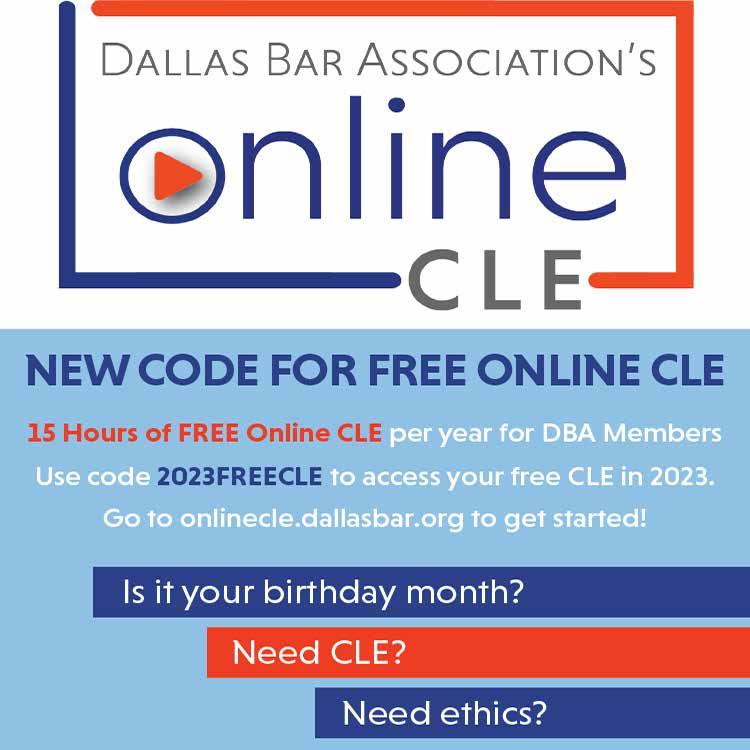
WEDNESDAY, OCTOBER 12
Noon Bankruptcy & Commercial Law Section
“Annual Bankruptcy Law Clerk Panel,” Alejandra Garcia Castro, Parker Embry, Caroline Nowlin, Emily Shanks, and Nikki Wood. (MCLE 1.00)*
Family Law Section
“Financial Security During and After Divorce,” Todd Healy and Celeste Moya. (MCLE 1.00)*
4:00 p.m. LegalLine E-Clinic. Volunteers needed. Contact mmejia@dallasbar.org.
THURSDAY, OCTOBER 13
Noon Solo & Small Firm Section
“Digital Security Pitfalls – Working Effectively Without an IT Dept,” John deCraen and Larry Kanter. (MCLE 1.00)*
CLE Committee. Virtual only
Publications Committee. Virtual only
Christian Lawyers Fellowship. In person only 6:00 p.m. DAABA’s Annual Awards Night
Special Guest Hannah Kim. Tickets at daaba.org. In person only at the Arts District Mansion.
FRIDAY, OCTOBER 14
Noon Government Law Section
Topic Not Yet Available
Trial Skills Section
“Trial Lawyers Under 40 – Navigating Trial as a Young Litigator,” Greg Brassfield, Elizabeth “BB” Sanford, Michelle Simpson Tuegel, and moderator Julie Pettit. (MCLE 1.00)*
MONDAY, OCTOBER 17
Noon Labor & Employment Law Section
“Mediating Covenant Not to Compete and Trade Secret Disputes,” Gary Fowler. (MCLE 1.00)*
3:30 p.m. Judicial Investitures for Associate Civil Court Judges
Hon. Ronald Hurdle and Hon. Tahira Kahn Merritt. In person only at the Arts District Mansion
TUESDAY, OCTOBER 18
Noon Franchise & Distribution Law Section
Topic Not Yet Available
International Law Section
“Representing Foreign Investors in the US – Tax and Estate Planning Issues,” Christian S. Kelso. (MCLE 1.00)*
Community Involvement Committee
WEDNESDAY, OCTOBER 19
11:30 a.m. Dallas Bar Foundation Fellows Luncheon
Recipient: Hon. Karen Gren Scholer. For more information contact ephilipp@dallasbar.org. SOLD OUT
Noon Energy Law Section Topic Not Yet Available
Health Law Section
“M&A in The Aesthetic and Cosmetic Market with ByrdAdatto and Skytale Group,” Bradford Adatto, Michael Byrd, and Ben Hernandez. (MCLE 1.00)* Virtual only
Law in the Schools & Community Committee. Virtual only
Pro Bono Activities Committee. Virtual only
4:00 p.m.
THURSDAY, OCTOBER 20
Dollar Trial Team,” Chris Hamilton and Ray T. Khirallah Jr. (MCLE 1.00)*
Christian Legal Society. In person only 4:00 p.m. DBA Board of Directors Meeting
FRIDAY, OCTOBER 21
Noon Living Legends Program Justice Deborah Hankinson, interviewed by Marina Amendola. (Ethics 1.00)* Virtual only
SATURDAY, OCTOBER 22
6:00 p.m. DHBA Noche de Luz More information at dallashispanicbar. com/2022AnnualEvent
MONDAY, OCTOBER 24
Noon Science & Technology Law Section “At the COPPA, COPPACabana: Keeping Kids Safe Online with the Federal Trade Commission,” Daniel Kaufman. (MCLE 1.00)* Virtual only
Securities Section Topic Not Yet Available
TUESDAY, OCTOBER 25
Noon Probate, Trusts & Estates Law Section
Topic Not Yet Available
5:30 p.m. Allied Bars Equality Committee Privilege Walk Join us for an interactive evening as we explore our own barriers and privileges and how we can more intentionally tackle diversity, equality, and inclusion in the legal profession. RSVP at dallasbar.org.
WEDNESDAY, OCTOBER 26
10:00 a.m. Community Blood Drive Sponsored by the DBA Community Involvement Committee and Carter BloodCare. At the Arts District Mansion. Additional locations and details at dallasbar.org.
11:00 a.m. Entertainment, Art & Sports Law Section “Dance Law Boot Camp at Sammons Center for the Arts,” Kent Barker, Amanda Dalton, Danielle Georgiou, and Bruce Wood. (MCLE 3.00, pending) More information and tickets at bit.ly/ dance-law-bootcamp.
Noon Collaborative Law Section What’s Up in the World of Civil Collaborative Law,” Kristen Blankley, Dianne Carlson, John Sarratt, Anne Shuttee. (MCLE 1.00, Ethics 0.25)* Virtual only
4:00 p.m. LegalLine E-Clinic. Volunteers needed. Contact mmejia@dallasbar.org.
THURSDAY, OCTOBER 27
Noon Criminal Law Section Topic Not Yet Available
Intellectual Property Law Section “Update on the NIL Landscape and Impacts of NIL Related Intellectual Property,” Max L. Forer. (Ethics 1.00)*
Minority Participation Committee
“Part 2 Honoring Diversity: Addressing Microaggressions in the Workplace,” Lisa Tomiko Blackburn, Cassie J. Dallas, D. Ryan Nayar , Kenya Scott Woodruff. (DEI Ethics 1.00)* Virtual only
FRIDAY, OCTOBER 28
Noon Pro Bono Awards Celebration
Help the Dallas Volunteer Attorney Program celebrate 40 years of Pro Bono! RSVP at tinyurl. com/probonoawards2022.
DBA/DAYL Moms in Law Lunch
At Sum Dang Good Chinese in Trinity Grove. RSVP rebecca.nichols@gmail.com OCTOBER 31
No DBA Events
LegalLine E-Clinic. Volunteers needed. Contact mmejia@dallasbar.org.
Noon Appellate Law Section Topic Not Yet Available Minority Participation Committee “Part 1 Honoring Diversity: Addressing Microaggressions in the Workplace,” Lisa Tomiko Blackburn. (DEI Ethics 1.00)* Virtual only Trial Skills Section “Divide & Conquer: The Anatomy of a Billion
MONDAY,
Scheduled
15 is National Hispanic Heritage Month. For information about the Dallas His panic Bar Association, visit https://dallashispanicbar.com/. For more on the DBA’s Diversity Initiatives, log on to
2 Headnotes l Dallas Bar Association October 2022
Visit
for updates on Friday Clinics and other CLEs. FRIDAY CLINICS OCTOBER 7 Noon Preventing Your Worst Tech Nightmare: Protecting Your Firm & Clients from Cybercriminals - The Right Way,” Doug Brown and Tom Kirkham. (MCLE 1.00)* Virtual only If special arrangements are required for a person with disabilities to attend a particular seminar, please contact Alicia Hernandez at (214) 220-7401 as soon as possible and no later than two business days before the seminar. All Continuing Legal Education Programs Co-Sponsored by the DALLAS BAR FOUNDATION. *For confirmation of State Bar of Texas MCLE approval, please call the DBA office at (214) 220-7447. **For information on the location of this month’s North Dallas Friday Clinic, contact yhinojos@dallasbar.org. Programs and meetings are presented Virtually, Hybrid, or In-Person. Check the DBA Online Calendar (www.dallasbar.org) for the most up-to-date information. Programs in green are Virtual Only programs.

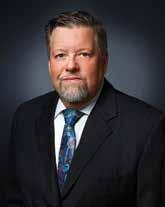
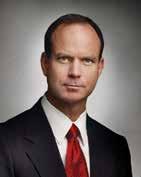
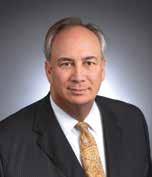
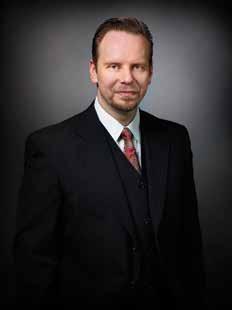
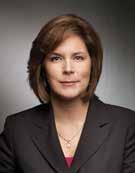
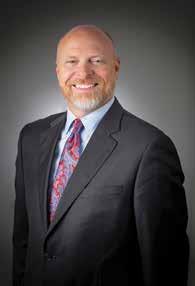
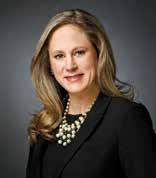

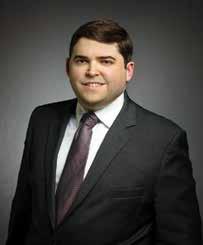

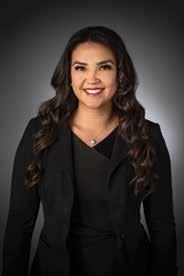
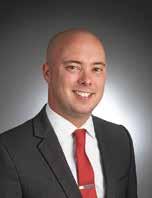
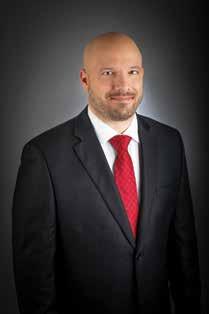
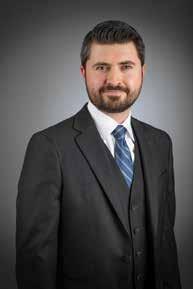
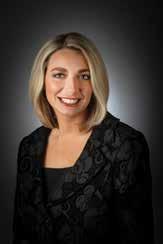
October 2022 Dallas Bar Association l Headnotes 3
BY KRISI KASTL
Yesha Patel, a former associate recently reminded me of some thing I said to her when she worked for me; “90 percent of success is showing up.” I continually strive to back those words up with action. The pandemic highlighted the importance of connection. We all recall the agony of weeks, turning into months and seasons passing in seclusion. This made coming together post-2020 so much more special.
There is a universal law of duality that says two different feel ings cannot exist without each other. In this light, the experience of abstaining from each other’s company during most of 2020 and some of 2021, has given us a new appreciation for the experience of the face-to-face interaction the virus initially prohibited. It also allows me to savor the good times both professionally and personally.
Showing up has been a guiding principle for me in my term as President. As you may remember, “Getting Back into the Groove” has been my theme for the year. I am sure we all can remember those confusing days of venturing out to reclaim what was once taken for granted. It is important to me that we come together to celebrate and learn from each other as many times as possible.
This is the Dallas Bar Association. As our mission implies, it is important for us to be there for our community as a whole and each other. I am proud of the membership that has continually shown up to make the world a bit brighter through advocacy, education, and acts of in-person service.

Sally Crawford, the DBA’s 104th president, and the eighth female president personifies the DBA’s mission by showing up with great intention and perseverance. Sally has traipsed the country in pursuit of her passions. Born in Ohio, she started her degree at The Ohio State University before she moved to my hometown of El Paso and transferred to UTEP She finished her educa tion at UT Dallas before heading out to law school and graduating with hon ors from Southern Methodist Univer sity School of Law. While studying for her law degree, Sally was also raising her newborn daughter Elizabeth. Soon after Law School, Sally joined the stellar firm of Jones Day where she became a partner in Mergers and Acquisitions. She showed up for her clients daily and made time for those who were less fortunate by continuously giving back.
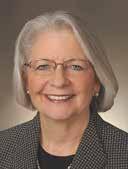
Sally is committed to affirming every voice by devoting count less hours to pro bono work. She has served on several boards that are dedicated to ensuring that access to justice is not limited to those who can afford it. Sally focused her DBA presidency and her professional life on equal access to justice regardless of socioeconomic status. She has served on several boards, including the Dallas Bar Association’s Community Service Fund, which oversees the Dallas Volunteer Attorney Program (DVAP), and the Board of Legal Aid of NorthWest Texas. Currently, she resides in Oklahoma where she is also passionate about reveling in the joys of grandparenthood by taking care of her grandchildren while her daughter Elizabeth focuses on her career as a lawyer.
In February, I felt my life moving into a full circle when I was able share El Paso with DBA board members for our annual retreat. El Paso was the perfect backdrop to forge a lasting bond. We ate amazing food
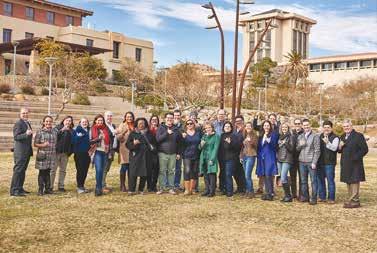
and reveled in the West Texas hospitality that must be experienced to be understood. We were delighted in learning from the Hon. Maria Salas-Mendoza, Judge of the 120th District Court and some one I got to know through my time as President of the Texas Wom an’s Lawyers Association. We learned about unique international law issues at the border from Federal Magistrate Mike Torres who grew up with me in Canutillo, Texas. We took in the border town sights that are foundational to my personal history as a UTEP grad. Dr. William Weaver, who heads the Law School Preparation Institute program at UTEP, gave us great insight into his program that encourages minor ity students to pursue a career in law. Vice President of University relations, Beto Lopez, gave us a magnificent campus tour and gave us a history of the Bhutanese architecture and how it came to UTEP. We had dinner at the State Line where I waited tables for many years. Even if I was tired, I left grateful for every shift I worked there. Show ing up made me a better waitress just like showing up now makes me a better president, attorney, daughter, wife, and friend. October and early November is full of opportunities for the DBA to show up, to learn, and grow together. In addition to our wonderful CLEs, we welcome the month on October 1 with the DAYL Bolton Ball at the Warwick Melrose Hotel. This is a great place to show up and meet like-minded people while supporting a great cause. On October 13, the Dallas Asian American Bar Association will host its Awards Night Gala & Celebration at the Arts District Mansion. On October 19 the Dallas Bar Foundation will host a luncheon recognizing the Hon. Karen Gren Scholer. On October 22, The Dallas Hispanic Bar Association celebrates its 17th Annual Noche de Luz at the Dallas Museum of Art. October 28 will mark the 40th anni versary of the Pro Bono awards. DVAP joins the DBA and Legal Aid of NorthWest Texas to host the annual Pro Bono Awards Celebra tion, which honors judges, attorneys, court reporters, and legal staff who provide free legal services to indigent residents of Dallas County.
On November 1, the Dallas Women Lawyers Association will host their 2022 Awards Reception at the Omni Hotel, and on November 5, join the J.L. Turner Legal Association Foundation for their Schol arship and Awards Gala at the Hyatt Regency Dallas. You can learn more about all of these events at www.dallasbar.org.

There are so many opportunities to show up and give back. We are a better organization having given our time and energies to the meaningful opportunities that grow our collective influence for posi tive change. I look forward to sharing and learning from you as we show up together.
Krisi
Headnotes
Published by: DALLAS BAR ASSOCIATION
2101 Ross Avenue Dallas, Texas 75201
Phone: (214) 220-7400
Fax: (214) 220-7465
Website: www.dallasbar.org Established 1873


The DBA’s purpose is to serve and support the legal profession in Dallas and to promote good relations among lawyers, the judiciary, and the community.
OFFICERS President: Krisi Kastl
President-Elect: Cheryl Camin Murray
First Vice President: Bill Mateja
Second Vice President: Vicki D. Blanton
Secretary-Treasurer: Liz Cedillo-Pereira
Immediate Past President: Aaron Z. Tobin
Directors: Lauren Black, Rob Cañas, Jonathan Childers (Chair), Stephanie G. Culpepper, Rocio Garcia Espinoza, Hon. Dennise Garcia, Ashlei Gradney (President, J.L. Turner Legal Association), Hon. Martin Hoffman, Andrew Jee, Andy Jones (President, Dallas Association of Young Lawyers), Jennifer King, Jonathan Koh (President, Dallas Asian American Bar Association), Elsa Manzanares (President, Dallas Hispanic Bar Association), Hon. Audrey Moorehead, Timothy Newman, Marisa O’Sullivan (President, Dallas Women Lawyers Association), Kelly Rentzel, Sarah Rogers (Vice Chair), Drew Spaniol, and Amy M. Stewart
Advisory Directors: Alison Ashmore (President-Elect, Dallas Women Lawyers Association), Carla Green (President-Elect, Dallas Hispanic Bar Association), Amber Hamilton Gregg (President-Elect, J.L. Turner Legal Association), Nadia Haghighatian (President, Dallas LGBT Bar Association), Nicole Munoz Huschka (President-Elect, Dallas Association of Young Lawyers), and Janet Smith (President-Elect, Dallas Asian American Bar Association)
Delegates, American Bar Association: Rhonda Hunter, Mark Sales
Directors, State Bar of Texas: Chad Baruch, Rebekah Brooker, Michael K. Hurst, Mary Scott, Robert Tobey
HEADNOTES Executive Director/Executive Editor: Alicia Hernandez Communications/Media Director & Headnotes Editor: Jessica D. Smith In the News: Judi Smalling Display Advertising: Annette Planey, Jessica Smith
PUBLICATIONS COMMITTEE
Co-Chairs: James Deets and Joshua Smeltzer
Vice-Chairs: Elisaveta (Leiza) Dolghih and Ted Huffman
Members: Logan Adcock, Benjamin Agree, David Brickman, Catherine Bright Haws, Ian Brown, Srinivasan Chakravarthi, Gracen Daniel, Lindsay Drennan, Alexander Farr, Dawn Fowler, Neil Issar, Beth Johnson, Andrew Jones, Alexandra Jones, Krisi Kastl, Jon Kettles, Brian King, Jared Knight, John Koetter, Alan Lightfoot, Margaret Lyle, Derek McKee, Majed Nachawati, D. Mason Parham, Keith Pillers, David Ritter, Carl Roberts, Sarah Rogers, John Shipp, Jared Slade, Sarah Spires, Jay Spring, Sarah-Michelle Stearns, Scott Stolley, Robert Tarleton, Paul Tipton, Anastasia Triantafillis, Pryce Tucker, Kathleen Turton, Peter Vogel, Benton Williams, Jason Winford
DBA & DBF STAFF
Executive Director: Alicia Hernandez
Accounting Assistant: Jessie Smith
Legal Education Coordinator: Viridiana Rodriguez
Communications/Media Director: Jessica D. Smith Controller: Sherri Evans Events Director: Rhonda Thornton
Executive Assistant: Elizabeth Hayden Executive Director, DBF: Elizabeth Philipp


LRS Director: Biridiana Avina
LRS Interviewer: Giovanna Alvarado
LRS Program Assistant: Marcela Mejia
Marketing Coordinator: Mary Ellen Johnson
Membership Director: Shawna Bush Publications Coordinator: Judi Smalling
Receptionist: Araceli Rodriguez
Staff Assistant: Yedenia Hinojos
Texas High School Mock Trial & Law Related Education Director: Melissa Garcia
DALLAS VOLUNTEER ATTORNEY PROGRAM
Director: Michelle Alden
Managing Attorney: Holly Griffin
Mentor Attorneys: Kristen Salas, Katherine Saldana
Paralegals: Whitney Breheny, Miriam Caporal, Tina Douglas, Nyssa Guajardo , Carolyn Johnson, Suzanne Matthews, Andrew Musquiz, Alicia Perkins
Community Engagement Coordinator: Marísela Martin
Program Assistant: Laci Payton
Secretary: Charnese Garrett
Copyright Dallas Bar Association 2022. All rights reserved. No reproduction of any portion of this publication is allowed without written permission from publisher.
Headnotes serves the membership of the DBA and, as such, editorial submissions from members are welcome. The Executive Editor, Editor, and Publications Committee reserve the right to select editorial content to be published. Please submit article text via e-mail to jsmith@dallasbar.org (Communications Director) at least 45 days in advance of publication. Feature articles should be no longer than 800 words. DISCLAIMER: All legal content appearing in Headnotes is for informational and educational purposes and is not intended as legal advice. Opinions expressed in articles are not necessarily those of the Dallas Bar Association.
All advertising shall be placed in Dallas Bar Association Headnotes at the Dallas Bar Association’s sole discretion.
Headnotes (ISSN 1057-0144) is published monthly by the Dallas Bar Association, 2101 Ross Ave., Dallas, TX 75201. Non-member subscription rate is $30 per year. Single copy price is $4.00, including handling.
Periodicals postage paid at Dallas, Texas 75260.
POSTMASTER: Send address changes to Headnotes, 2101 Ross Ave., Dallas, TX 75201.
“Courage starts with showing up and letting ourselves be seen.”
– Brené Brown
Sally Crawford
4 Headnotes l Dallas Bar Association October 2022
President’s Column Showing Up: For Our Community and Each Other
Justice Deborah G. Hankinson Hankinson PLLC Friday, October 21 | Noon - 1:00 PM MCLE: 1.00 Ethics Hosted virtually on Zoom. Register at Dallasbar.org. Interviewed by Marina S. Amendola, The Toro Company DOWNLOAD OUR APP TO STAY CONNECTED SCAN THE QR CODE BELOW
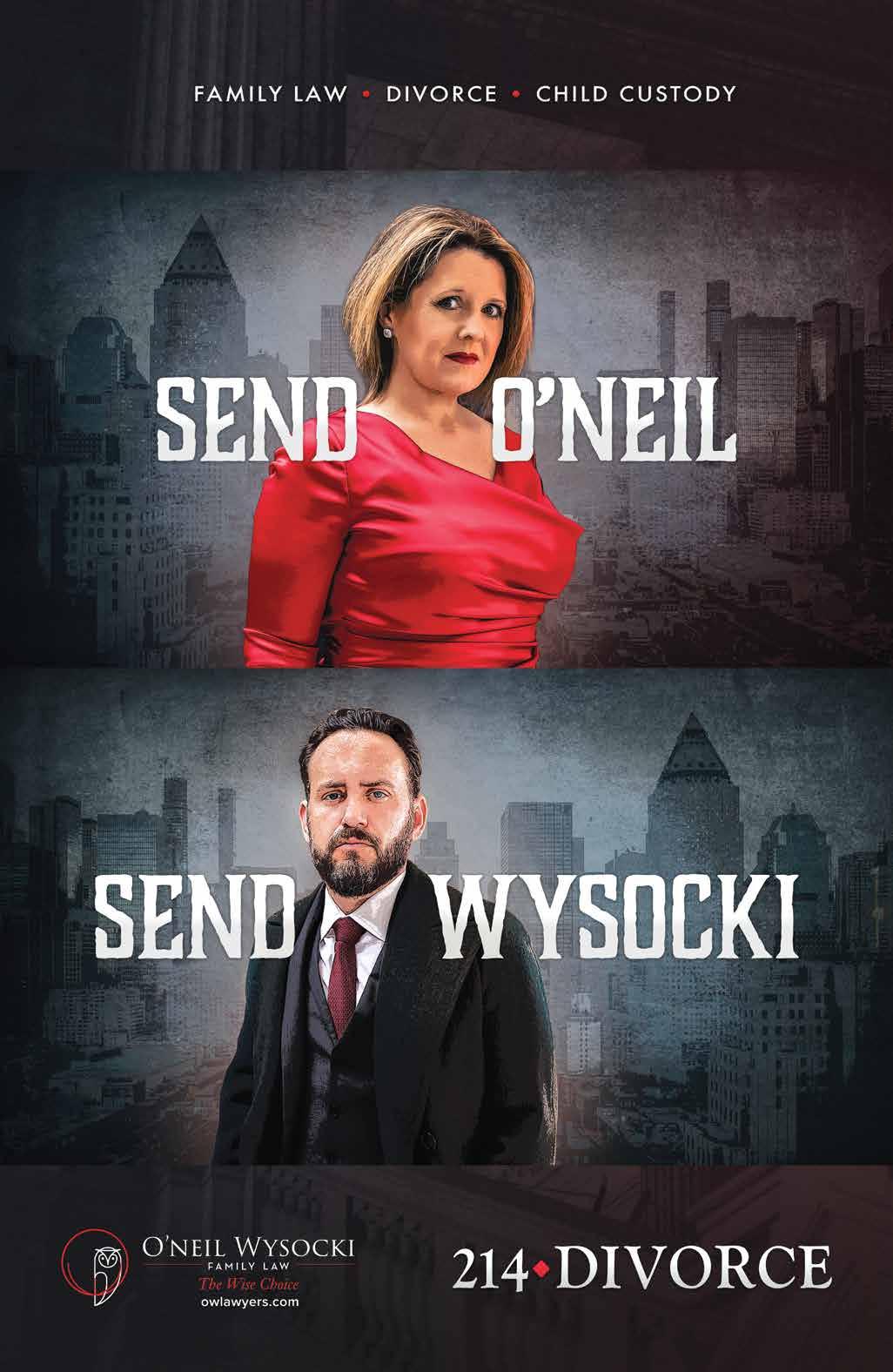
October 2022 Dallas Bar Association l Headnotes 5
BY KAREN ENSLEY
Usury is defined as charging an interest rate that exceeds the maximum amount allowed by law. Contracts that charge usurious rates are contrary to public policy and are subject to statu tory penalties set out in Section 302 of the Texas Finance Code.
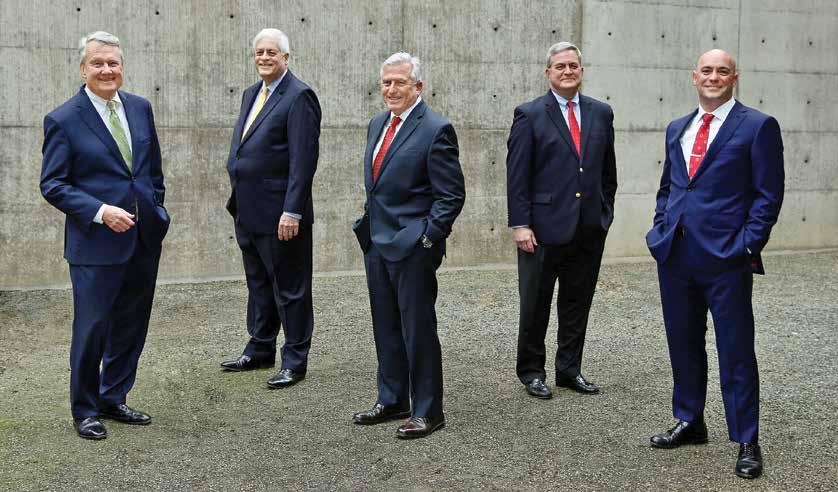
The determination of the maximum rate depends on many factors and includes not just interest charges but other charges such as late fees. For example, charging a late fee of 5 per cent per month equates to an annu alized interest rate of at least 60 per cent—clearly a violation. What is not as obvious is that charging 1.5 percent in compound interest per month results in an annual interest rate that is above the default maximum rate of 18 percent.
The elements of a usurious transac
tion are: (1) a loan of money, (2) an absolute obligation to repay the principal, and (3) charging the debtor more than allowed by law for the use of the money. However, usury laws apply to more scenarios than just loans of money. Service contracts, including construc tion contracts, can also be subject to usury laws because the contractor is a creditor extending credit to a debtor with an absolute obligation to pay for the services provided.
Not all transactions that would appear at first blush to trigger a usury claim actually do. For example, an equipment rental is not subject to usury analysis because a rental of property is treated differently than a loan of money, such as would occur if the trans action were for a lease-purchase of the same equipment.
A usury claim arises when a credi
tor makes a usurious charge or demand against the debtor. How the demand is conveyed to the debtor is immaterial. The demand can be an invoice, let ter, accounting ledger, text, email, or any other document, including terms in a written contract. The use of the words “demand” or “charge” are not required, but there must be an unequiv ocal demand for a sum beyond what the creditor is entitled to assert by law.
A creditor’s “charge” is not action able unless communicated to the debtor. Thus, unilaterally placing an otherwise usurious charge on an account, with out communicating the charge to the debtor, does not constitute a charge. Nor does every mention of interest or a service charge amount to a charge or demand. For instance, if an invoice has printed terms stating that a usurious ser vice charge will be added to late pay ments, but the creditor takes no action to charge or collect the usurious inter est, then no such charge has occurred.
Intent is not generally an essential element of a usury claim unless the terms of the transaction are ambiguous. Usury is instead established if the credi tor unambiguously intends to make the bargain that was made, and the bar gain involves contracting for, charging, or receiving usurious interest. Further, the debtor’s agreement to the usuri ous charge at the time the contract is formed cannot be used to avoid a usury violation.
The maximum penalties available to the debtor depend on several fac tors, including whether the debtor is a consumer and whether the usurious charge is more than twice the legal

maximum. For transactions involving personal, family, or household goods, the penalty for usury is calculated as the greater of (1) three times the difference between the interest allowed by law and the amount contracted for, charged, or received or (2) the lesser of $2,000 or 20 percent of the principal. For a commer cial transaction, the penalty for usury is calculated as three times the net interest overage. When the creditor charges and collects more than twice the maxi mum allowable rate, the creditor must disgorge all monies received under the usurious contract.
As a prerequisite to asserting a usury claim, the debtor must give the creditor written notice and a 60-day opportunity to cure, unless asserted as a defense in a claim brought by the creditor. If the creditor does not correct the violation within the 60-day window, the statu tory penalties apply. Unlike many other areas of law, there is no “should have known” or “reasonable person” stan dard. Actual knowledge is required and therefore the creditor must either dis cover the violation on his own or be provided with the statutory notice and opportunity to cure prior to the debtor’s filing of suit.
Client education is the key. Know ing what amounts can and cannot be charged, what actually constitutes an interest charge, and how to properly respond to a usury notice and defend against a usury claim can help your cli ent avoid a very avoidable financial disaster. HN
Karen Ensley is a Partner at Ensley Benitez Law, PC and can be reached at karen@eblawtexas.com.
6 Headnotes l Dallas Bar Association October 2022
Avoiding and Curing Usury Claims Focus Tort & Insurance Practice/Trial Skills FEDERAL & STATE CRIMINAL DEFENSE | FEDERAL & STATE CIVIL TRIAL MATTERS Knox Fitzpatrick ✯ Jim Jacks ✯ Bob Smith ✯ Mike Uhl ✯ Ritch Roberts 500 NORTH AKARD STREET, ROSS TOWER, SUITE 2150 DALLAS, TEXAS 75201-6654 | 214-237-0900 *Independent Law Offices FREE MCLE J O I N O R R E N E W N O W A T W W W . D A L L A S B A R . O R G . One of the many Member Benefits that the DBA offers is more than 400 CLE courses each year, most of which are offered at no charge

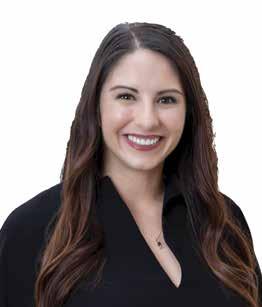

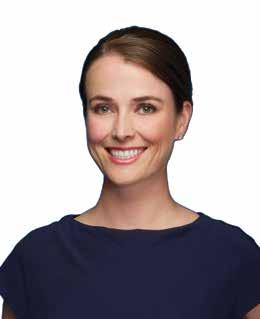

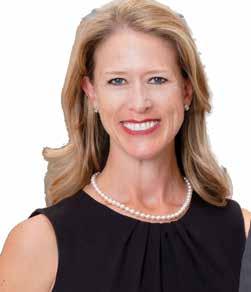
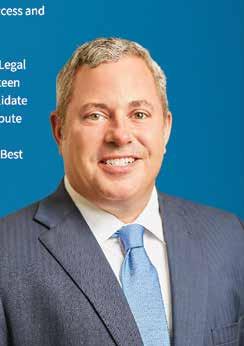
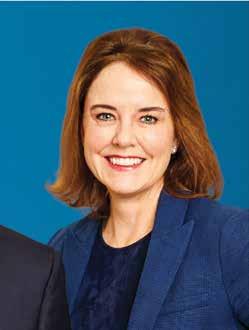
 ABBY O. GREGORY PARTNER
ALISSA CASTRO PARTNER
AUBREY M. CONNATSER MANAGING MEMBER
JERE H. HIGHT PARTNER
JANA W. PAUL
ABBY O. GREGORY PARTNER
ALISSA CASTRO PARTNER
AUBREY M. CONNATSER MANAGING MEMBER
JERE H. HIGHT PARTNER
JANA W. PAUL
October 2022 Dallas Bar Association l Headnotes 7
CONGRATULATIONS 2023 BEST LAWYERS IN AMERICA FOR FAMILY LAW ® 2919 Welborn Street, Dallas, Texas 75219 214- 306-8441 connatserfamilylaw.com info@connatserfamilylaw.com
BY SHANE READ
One of the greatest myths of crossexamination is that Irving Younger’s 10 Commandments are infallible. These commandments have been widely taught in law schools and CLEs for decades. Younger was a strong believer in his commandments. He wrote, “You should never violate them.” Most of his commandments do a great disservice to trial lawyers, but none so much as the 10th. In number 10, Younger proclaims that “you should save the ultimate point for summation.” Younger argues that during your cross you should ask “the one question” that the jury will not understand why you asked—but you ask it anyway, because you know that you can explain it in closing argu ment. He further advises, “The temp tation, however, is to explain it all on the cross-examination. How do
you explain it? By asking the witness a question that permits the witness to explain… You must save it.”
The admonition to “save it for summation” assumes that jurors are not human but rather data banks that you can just pour information into during a trial and that they will somehow be able to recall in closing argument a very discrete point you made days or weeks earlier on cross-examination. It also wrongly assumes that jurors will keep an open mind until the final moments of a trial. Instead, jurors make up their minds quickly and see cross-examina tion as a battle between the credibility of you and the witness. If you followed Younger’s commandment, your cross would confuse jurors and they would lose trust in your ability to help them make a decision about the case.
Despite the clear pitfalls, Younger proclaimed that if you did not follow
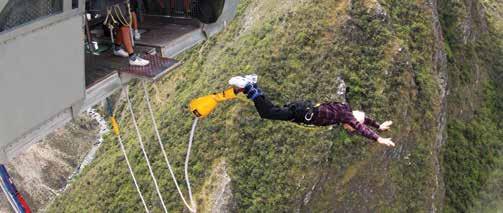
his commandments, your cross-exami nation would “blow up in your face.” I could not disagree more. The 10th commandment can fail you completely. It should be replaced with a new com mandment to “Never save it for sum mation. Make your points clearly on
questions hoping to wrap it all together in closing as Younger commands? Of course not.
cross now!” Jurors are quickly deciding who won the battle of cross-examination, and you need to make sure they know who won.

To illustrate this point, look at what one of the greatest civil attor neys in the country does on crossexamination. Mark Lanier, “one of the decade’s most influential lawyers” according to the National Law Journal , does the exact opposite of Younger’s 10th commandment for all of his crossexaminations. In a recent trial, he was suing Johnson & Johnson and DePuy on behalf of plaintiffs who had hip replacement surgeries using DePuy hip implants that were allegedly designed defectively.
Lanier’s cross-examination of DePuy’s president took a full day. Do you think he snuck in some subtle
Instead, for the entire day, he had three themes. That is all. And just so it was crystal clear for the jury and the witness what the ultimate questions were and that he was not saving any thing for closing, he wrote each theme on the top of a sheet of paper that he displayed on a projector to the jury. Throughout the cross, he would return to the theme at the top of the page and remind the jury about what his main points were. Lanier’s three themes were: 1) “I want the jury to hear from you how marketing/sales run the com pany, not science;” 2) the wording used in advertising DePuy hip implants provided confusion instead of clarity; and 3) Johnson & Johnson and DePuy are companies that are intertwined (John son & Johnson was denying responsi bility for what DePuy had done).
By consistently circling back to his three themes on cross-examination, Lanier was able to establish Dupuy’s negligence. He did not wait for closing argument to win the battle for truth. Consequently, the next time you are cross-examining a witness, make your points clearly and do not hold back. Do not follow Younger’s advice or you may miss a golden opportunity to win your case. HN
Shane Read trains and coaches lawyers on deposition, trial, and oral advocacy skills based on his textbooks. He can be reached at shane@winatpersuasion.com.
Younger’s 10 Commandments of Cross-Examination Not Gospel Focus Tort & Insurance Practice/Trial Skills 8 Headnotes l Dallas Bar Association October 2022 RISK-TAKING CAN BE FUN... …BUT NOT WHEN IT’S A MALPRACTICE CLAIM. Real Estate Litigation Claim* • Lawyer sued for error in service of process • Damages of up to $1,000,000 alleged • TLIE settled claim for $2,500 INSURED BY TLIE IF NOT INSURED Total out-of-pocket = $1,000 (deductible) Defense costs $35,000 Settlement + $2,500 Total out-of-pocket = $37,500 * Based on actual claim handled by TLIE. FIND OUT MORE: TLIE.ORG or (512) 480-9074WWW.THOMASRONEYLLC.COM Personalinjury Wrongfultermination Intellectualproperty Commercialdamages/lostprofits Businessvaluations Whenyouneedanumber callournumber 817.733.6333 DAMAGES DALLAS•FORTWORTH•HOUSTON•ATLANTA Practice Tip Your themes on cross should be so clear that if someone walked into the courtroom and knew nothing about your case, they would be able to easily follow and be convinced by the points you are making. Attention Young Lawyers! LEARN FROM THE TRIAL MASTERS November 2 9:00 am to 5:00 pm Arts District Mansion MCLE 7.00 Elite trial lawyers will demonstrate how to try a civil case before a jury. Visit DallasBar.org to learn more DBA/DAYL Moms in Law Being a working mom can be challenging. Being a working lawyer mom can be a different ballgame with its own unique challenges. Moms in Law is a no pressure, no commitment, informal, fun, support group for lawyer moms. Join Moms in Law for lunch Friday October 28, Noon, at Sum Dang Good Chinese in Trinity Grove To RSVP for this lunch, email Rebecca Nichols at rebecca.nichols@gmail.com

October 2022 Dallas Bar Association l Headnotes 9 IP LITIGATION + COMMERCIAL LITIGATION
BY SUMMER FREDERICK
Cybersecurity (or cyber) insurance is a means of risk transfer gener ally intended to protect businesses from internet-based threats. Cyber insurance is intended to assist with data breaches involving customer information or dam age to a business’s own network. The number of businesses currently carrying cyber insurance coverage is considerably greater than a decade ago, yet still remains relatively small.
Cyber insurance is different from other insurance coverages, and there is no standard policy form.
Policies may contain first-party and third-party coverages. First-party cover age protects businesses against their own financial losses, for example, when data breaches or cyberattacks result in the destruction or damage of data. Privacy
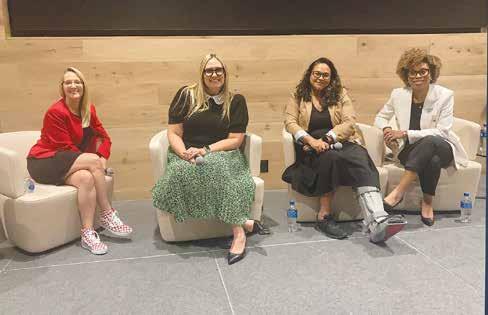
breach response coverage is one form of first-party coverage, which may encom pass legal fees, costs associated with the insured’s requirement to notify affected parties, network asset protection costs, regulatory defense and associated penal ties, and business interruption losses.
Third-party coverage protects against losses for which a business may be respon sible because of a breach of client data. Coverages may include multimedia loss coverage or network security coverage for claims made by third parties arising out of a breach of the insured’s network.
The relative newness of cyber insur ance products means that there is a lack of historical loss data available to assist with underwriting risks and advising insureds with respect to appropriate coverage. If a carrier has lower risk tolerance for particular kinds of threats, and an insured does not understand the product
it has purchased, there can be significant gaps in which there is no coverage.
There are two forms of cyber-attacks for which businesses often decide to purchase cyber insurance, which may not be covered. The first is a social engineering attack. Social engineering occurs when malicious actors trick company employ ees or executives into providing creden tials, transferring funds, or making pur chases. Social engineering may involve the malicious actor impersonating an authoritative figure or legitimate user such as a manager, posing as a third-party vendor or supplier, phishing, and dump ster diving. Losses caused by social engi neering can be significant.
Losses caused by social engineering may not be covered under a cyber insur ance policy. This is because many insurers include exclusions for “voluntary parting” of title to or possession of prop erty. Most courts construing these exclu sions have found the provision of money or credentials to be actions undertaken voluntarily, even if the person transfer ring the money or information mistak enly believes they are authorized to do so. As a result, financial losses that busi nesses sustain from social engineering schemes may be excluded. Furthermore, even if a policy affords coverage for social engineering, the coverage may be subject to a policy sub-limit that is much lower than what is necessary to mitigate the damage caused.


Businesses may also purchase cyber insurance to mitigate against the threat


of ransomware attacks. Ransomware is an attack designed to infiltrate computer sys tems and deny access to legitimate users, after which the cybercriminals demand payment in exchange for a decryption key. If an organization pays a ransom, the insured may waive coverage. This is because a ransomware attack may not be considered a true data breach. Some poli cies also may define “loss”, “damage”, or “physical damage” in ways that do not include ransom payments.
Many carriers now exclude ran som payments due to a sharp uptick in these kinds of claims as more employees were forced to work remotely during the CovidCOVID-19 pandemic. The grow ing ransomware trend caused insurers to question whether the payout of these claims was driving up the cost of ran soms, making coverage more harmful than helpful.
Cyber threats will continue to grow and evolve. As historical loss data becomes more available, insurers will be able to appropriately rate policies, and insureds will be able to make more informed decisions about their coverages. Increased claim frequency and severity may result in higher rates for less cov erage as carriers decide what risks are acceptable and whether to assume them. At the end of the day, no amount of risk transfer can replace diligence and train ing. HN
Summer Frederick is a Senior Attorney at Cooper & Scully PC. She may be reached at summer.frederick@cooperscully.com.
Hut hosted the DBA program. Lauren Leahy, Savannah Franklin, Chantel Cheatham, and Jasmine M. Tobias for inspiring presentation.
10 Headnotes l Dallas Bar Association October 2022
Cybersecurity Insurance: Current Conditions Focus Tort & Insurance Practice/Trial Skills TURLEY LAW CENTER Professional Friendly On-Site Staff 24-hour Cardkey Access Complimentary Valet Reserved Conference Room (No Charge) High-Speed Internet Deli Serving Breakfast & Lunch Full Service Salon & Spa ATM FedEx Drop Box Near Dart Station Satellite TV Connections Car Detail Service Furnished Executive Suites Conveniently located at N. Central Exp. & University Blvd. Competitive lease pricing. Is your office building “Dog Friendly?” OURS IS! TAKE A TOUR! Email us at Brendag@wturley.com or call 214-382-4118 Associate Judges and Magistrates: Who They Are and What They Do Tuesday, November 1 • 3:30 - 5:30 p.m. with Happy Hour to Follow Arts District Mansion MCLE: 2.00, Ethics 1.00 RSVP at DallasBar.org Confirmed Speakers: Hon. Steven D. Autry, Criminal District Court Magistrate Hon. Ronald B. Hurdle, Associate Judge, Civil District Courts Hon. C. Drew Ten Eyck, Associate Judge, 301st District Court More to be announced • Sponsored by the DBA Judiciary Committee In September, Pizza
WE LEAD
Thank you for the hospitality and fantastic program sessions! A special thank you to
their
DBA WE LEAD
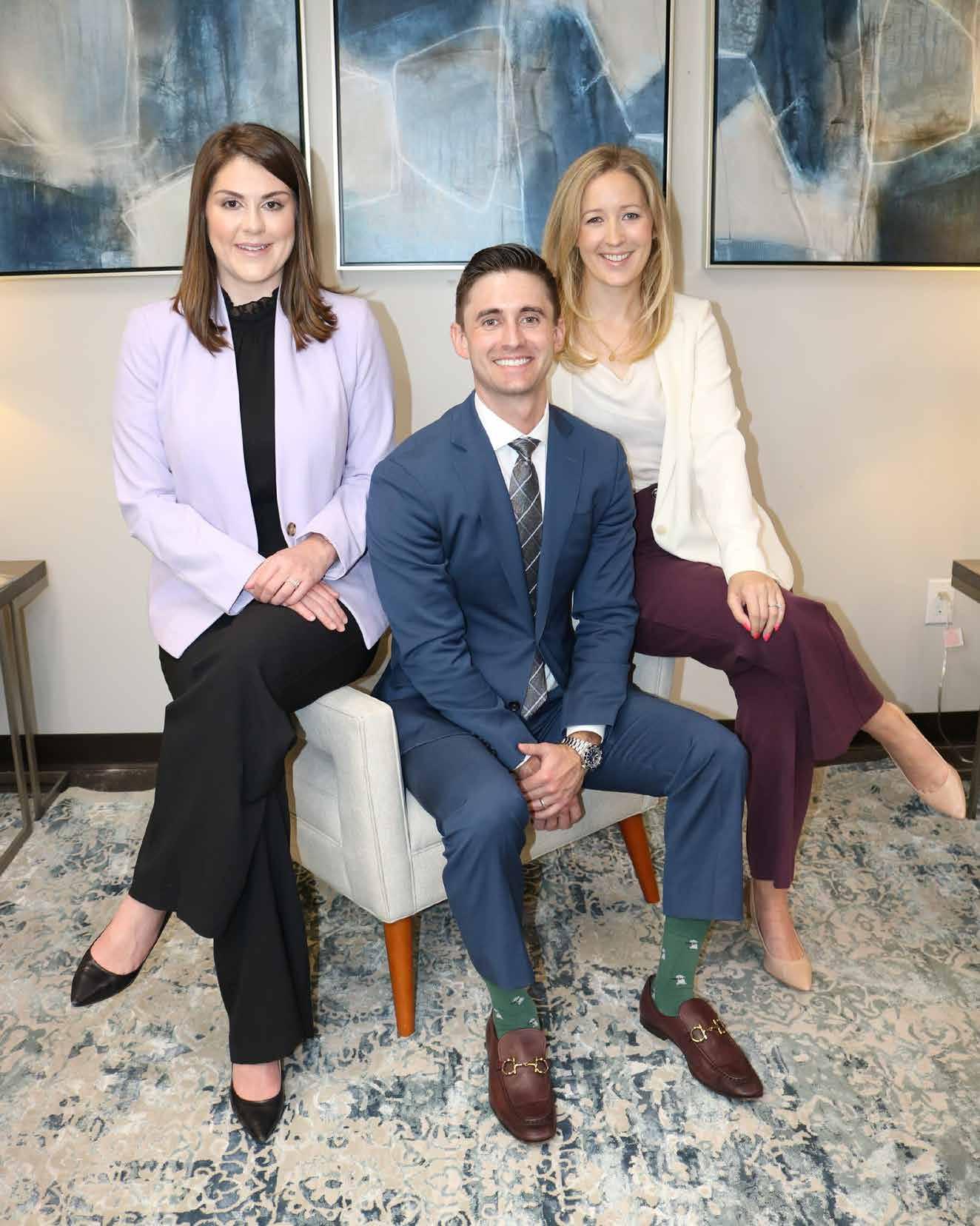
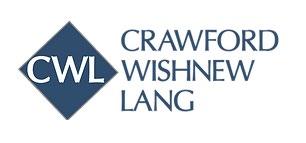
October 2022 Dallas Bar Association l Headnotes 11 CWL is delighted to announce it has promoted associates Haleigh Jones, T.J. Jones, and Ali Ohlinger to join our partnership. They have demonstrated their maturity as lawyers, and we look forward to what they will accomplish as our firm’s newest partners. Assertive Advocates. Trusted Advisors. 1700 Pacific Ave., Suite 2390 │ Dallas, Texas 75201 │ 214.817.4500 www.cwl.law MEET CWL’S NEWEST PARTNERS
BY JULIE PETTIT GREESON of Forgetful
We have all encountered an adverse witness that can remember every detail of his birthday party in 1978 but can not remember anything about criti cal moments just six months ago. The familiar response “I don’t know” or “I can’t remember” or any other iteration can quickly become the anthem of a witness.
The challenge is to keep control of the witness and steer the dialogue in a direction that benefits your client. You should treat a forgetful witness differ ently depending on whether you are at trial or in a deposition. In either set ting, there are practical steps to either discover the hidden details or discredit the witness.
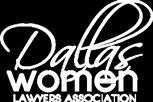
A forgetful witness in a deposition can be extremely frustrating—especially if it is a key witness whose testimony is needed to prove your case. Going into the deposition, opposing counsel may have coached the witness to be unapol ogetic about memory lapses. Thus, the witness may unintentionally (or inten tionally) try not to remember facts on the fringes of their memory.

Listen Carefully
First, listen carefully to what the witness precisely says. The “I don’t really know” response (or its siblings: “I’m not certain,” “I don’t remember specifically,” and the like) should raise a red flag. This signifies that the wit ness has some memory of the event. Start by asking general follow-up ques tions to determine what, if anything,

the witness can recall. Then focus in and ask the witness what they mean by specific words in their response. Make your questions as granular as possible, to ensure you have parsed out every detail the witness does remember. Ask similar questions in different ways to make sure the witness is not simply splitting hairs based on your wording.
Turn Up the Pressure
Second, if you believe the witness is being dishonest, turn up the pressure. Refresh their recollection with as many documents as you can. Be prepared with documents that strongly suggest the witness knows more than they are revealing. Provide the witness with any and all documents that could help them recall the events. Being forced to stare at a document that suggests dishonesty can shake the witness’s nerve.
Lock Them in as a Forgetful Witness
Third, if the witness still will not budge, lock in this witness as a forgetful witness so that you can eliminate his or her testimony from being useful at sum mary judgment or trial. Ask questions from every possible angle and on all related topics. Build a record that the opposing counsel cannot wiggle out of. The Sham Affidavit Rule can be useful if the opposing counsel uses an affidavit sworn by the witness in the future. Most capable attorneys will attempt to subvert the Sham Affidavit Rule by offering different documents later to

“refresh” the witness’s memory. To pre empt this tactic, during the deposition, ask about the existence of any documents that would refresh their recol lection. Helpful questions would be: “ Is there anything you could look at that would refresh your memory?” “Are there any documents that could help you remem ber?” “Who else could I talk to that might know the answer?”
A skilled lawyer will deal with a forgetful witness at trial much differently than at a deposition. At trial, the only time the answer to a question should be “ I don’t know ” is if the attorney plans to attack the witness’s credibility. Thus, if a witness responds with “ I don’t know ,” you have three options: (1) impeach the witness, (2) refresh the witness’s memory, or (3) move on.
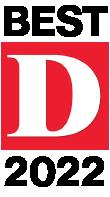
Ideally, on cross examination at trial, you will know that your witness is going to use the “ I don’t know ” response and thus you are prepared to impeach the witness by attacking their credibility. If the witness can recall facts about the event, but cannot remember the critical details, that is a gift—exploit it. Fol low up with questions like: “ Where was the meeting ?” “ How long was the meeting ?”
“ Was X at the meeting ?” “ So, you can remember everything else about the meet ing, but you cannot tell me a single detail about the content of the meeting itself ?” Establish that the witness remembers
the event with quick successive ques tions and then highlight the conve nient lack of memory only for essential details. Convince the jury the witness is deliberately holding back.
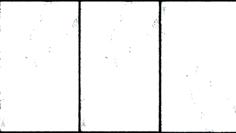
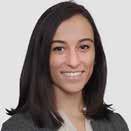

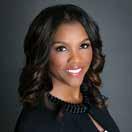
If your adverse trial witness forgets something that he or she should remem ber, you can try to briefly refresh the witness’s testimony if you believe the witness can recall the answer but may need assistance getting there. However, jurors can lose focus as the witness reviews documents. Further, if you do not succeed, the jury may perceive this as a waste of time, damaging your rap port with the jury.
Moving On
Lastly, at trial, moving on is the best option if you did not anticipate the wit ness’s response. Avoid digging in your heels and arguing with the witness. It is often more effective to simply move on to a topic that the witness does recall. These strategies are only effective if the attorney is prepared. There will always be difficult witnesses, but they do not need to be destructive. A for getful witness subjected to effective cross examination can be helpful to your case. HN
Experienced. Over 30 years, in Texas and nationally, Martin Merritt litigates cases against the FBI, DEA, OIG, CMS, AUSA, TMB, Tex. OAG, Tex. Med. Bd, Pharm. Bd., TXDSHS, Civil False Claims Act Subpoenas and lawsuits, civil investigative demands, arbitration, criminal and other administrative actions. He has a proven track record applying this knowledge to win victories for business litigators.

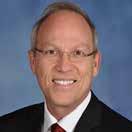
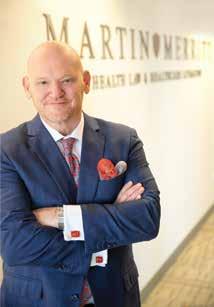 Julie Pettit Greeson is the founder of The Pettit Law Firm. She can be reached at jpettit@pettitfirm.com.
Julie Pettit Greeson is the founder of The Pettit Law Firm. She can be reached at jpettit@pettitfirm.com.
12 Headnotes l Dallas Bar Association October 2022
“I Don’t Recall”: Cross Examination
The
Witness Focus Tort & Insurance Practice/Trial Skills MARTIN MERRITT Health Law and Healthcare Litigation “I highly recommend Martin As Co-Counsel in Healthcare Litigation Cases.” --Brad Jackson/ Commercial Litigator, Dallas • Healthcare Trials/Hearings Analysis of Illegal “kickback” contracts • Enforceability of 15.50 Non-Competes Insurance “Clawbacks” • FBI, OIG, CMS Investigations Medical License Revocations Martin Merritt Chair, DBA Health Law (2021) Ex. Dir. Texas Health Lawyers Association Martin@MartinMerritt.com Dir. (214) 952.1279 Martin Merritt is your co-counsel in healthcare litigation cases. If one side has an experienced health lawyer in their firm and you do not, you can level the playing field by associating Martin Merritt as co-counsel. You keep the client. Hourly and flat monthly rates available. Martin can try the case, prepare and argue hearings, or simply serve as health law analyst. You stay in control of the case and keep the client.
(D Mag. Best 2018, 2020, 2022) 2 0 2 2 A W A R D S R E C E P T I O N Dallas Women Lawyers Association 01 Nov 2022 6:00 9:00PM Omni Dallas Hotel JUSTICE DENNISE GARCIA JENNIFER MORR S VERONICA MOYÉ RAHA ASSAD JUST CE ER N NOWELL JOHN TORRES Louise B Ragg o Award Outstand ng Corporate Counse Outstanding Woman Lawyer R s ng Ragg o Outstand ng Jur st James E Coleman Jr Her Champion Award Recogniz ng outstanding ind viduals for their contributions to e evating the standing of women in the egal profession 2022 Evening of Ethics Tuesday, October 11 • 5:00 - 8:00 pm MCLE: 3.00 Ethics • Hosted on Zoom Topics Include: • Ethical Communications with the Court and its Staff • Zealous Client Advocacy in Civil and Criminal Litigation • The Texas Grievance Committee Process • Strategies in Litigation of Complaints Free for DBA Members Registration opens September 1


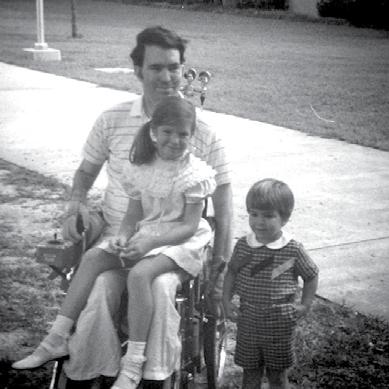

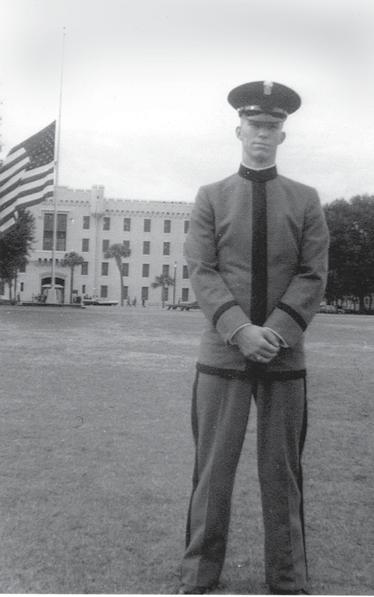

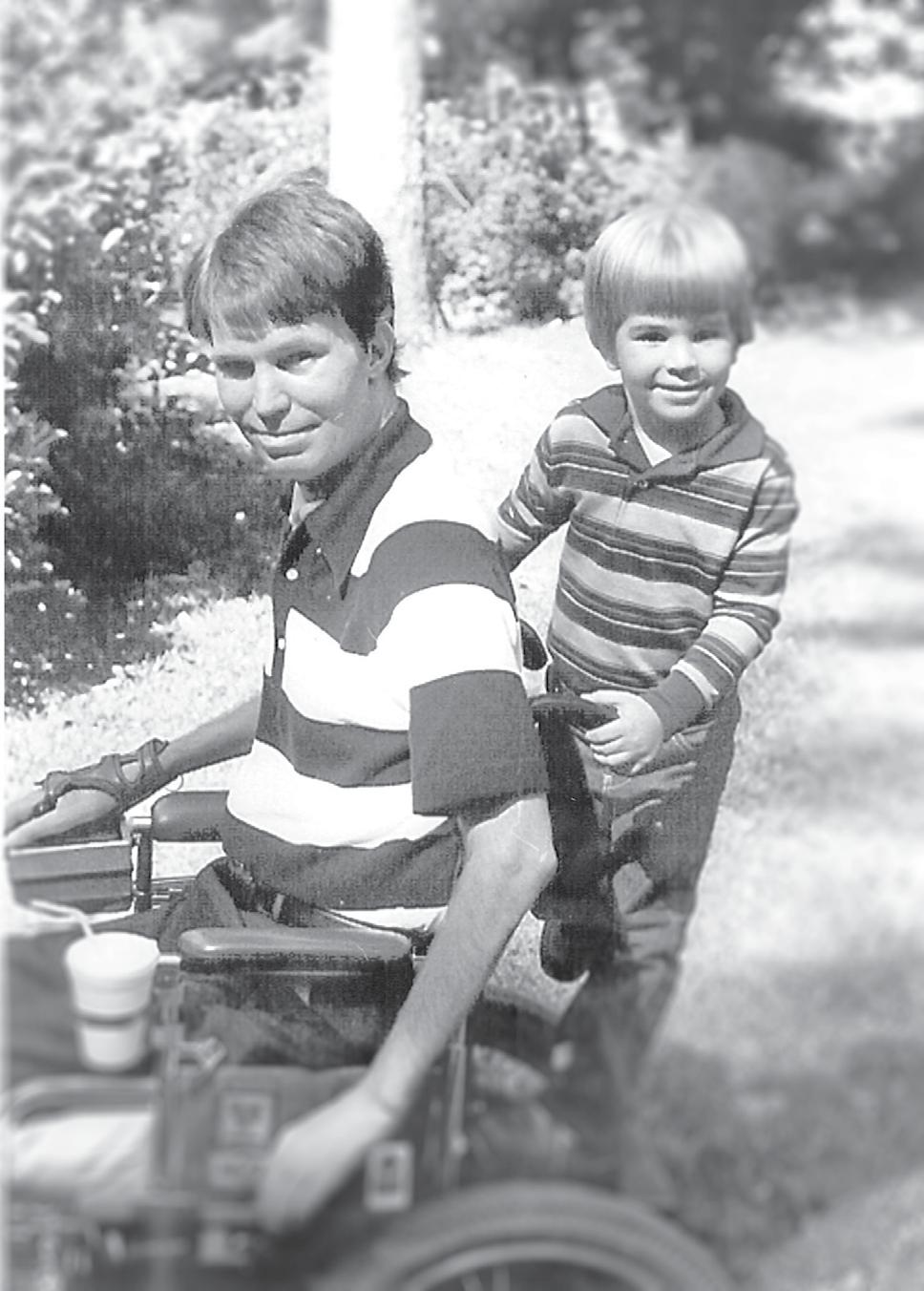




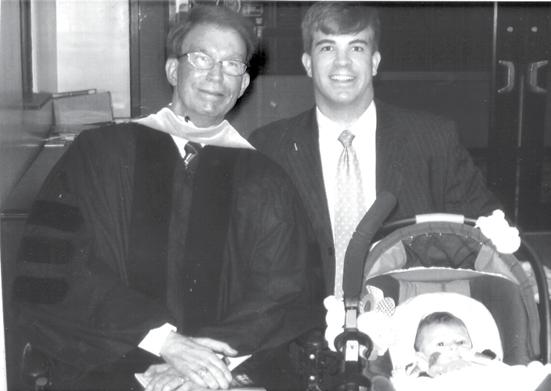
October 2022 Dallas Bar Association l Headnotes 13
BY CHRISTINE HOPKINS
A little over two years after the COVID-19 pandemic began, Texas employment lawyers are finally getting a look at what post-pandemic jury panels and jury verdicts will look like in this state.
A recent $70 million jury verdict coming out of the Eastern District of Texas, Plano Division, in a section 1981 race discrimination and retaliation case, made the front page of the Dallas Morn ing News, with a 21-year-old female juror from Allen, Texas telling the paper that the experience “restores faith in the jus tice system.”
That result in Yarborough, et al. v. Glow Networks, Civil Case No. 4:19-cv00905-SDJ, which breaks down into a $3 million pain and suffering award and $4 million punitive damages award for each of 10 workers who stood up to hold their employer accountable for racial discrimi nation cannot be discounted as a one-off post-pandemic success story.
Six other jury panels also rendered sig-
nificant verdicts in favor of employees in Texas in a short two-month period of time following the Yarborough verdict. All told, the jury-awarded damages alone, prior to attorney’s fees or front pay awards, totaled an additional $6,406,500 million in these six cases.
Three of those six verdicts were ren dered against private employers in March of 2022, with each jury panel hand ing down punitive damages awards that exceeded their awards for pain and suffer ing and back pay.
In Dhenel v. Boxer Property Manage ment Corporation, a case tried on March 3, 2022 in the 342nd Judicial District of Tarrant County, punitive damages consti tuted $250,000 out of the $369,000 the jury awarded to a hotel sales manager who was fired approximately two months after reporting her boss to human resources for age discrimination.

In Oden v. Wellfirst Technologies, Inc., a case tried in the Southern District of Texas, Corpus Christi Division, punitive damages constituted $450,000 out of the
$750,000 March 4, 2022 jury verdict ren dered in favor of a tools salesman who was fired approximately two months after undergoing a knee replacement surgery.
In Carter vs. California Grill, LLC, a case tried in the Western District of Texas, Austin Division, punitive damages con stituted $90,000 out of a $150,000 award rendered on March 30, 2022 in favor of a waitress who endured racial slurs and retaliation after she reported the slurs to the General Manager.
Government employers fared worse in terms of the amount of adverse jury ver dicts coming down from jury panels in March and April of 2022, with jurors tak ing the opportunity to award significant pain and suffering damages.


On March 1, 2022, in Nikolova v. University of Texas at Austin, a jury sitting in the Western District of Texas, Austin Division, awarded only $50,000 in lost wages, but $3 million in past and future pain and suffering damages to an accom plished female professor who was denied tenure after becoming pregnant during her pre-tenure review period.
On March 2, 2022, in Miller v. Texas Alcoholic Beverage Commission, another Western District of Texas, Austin Divi sion jury awarded $250,000 in pain and suffering damages but just $37,500 in lost wages to a TABC agent fired by a superior seven months after testifying against that superior in an internal sexual harassment investigation.
On April 7, 2022, in Harmon vs. Texas
Department of Criminal Justice, a jury sit ting in the Eastern District of Texas, Beaumont Division rendered an $800,000 pain and suffering award and a $1 million award for lost wages and benefits in favor of a correctional officer who took a medi cal leave for diabetes, suffered a demo tion, and was then terminated after filing an internal EEO complaint and taking another medical leave.
Of additional significance, in each of the seven favorable plaintiff’s verdicts that began with Yarborough on Febru ary 18, 2022 and ended with Harmon on April 7, 2022, jurors answered “yes” to discrimination and retaliation questions presented under a “but for” or “solely because of” standard.
The number of plaintiff-side ver dicts over such a short time period in 2022 does not appear to be the simple result of COVID backlogs. Employment cases were in fact going to trial in Fed eral courts and some state courts in Texas in 2021, with employee plaintiffs see ing a total of $7,435,286.06 in awards in one state court and five Federal court jury verdicts rendered in the May to July 2021 time period. The adage that it is dif ficult to win workers’ rights cases in Texas especially in Federal court may simply no longer be true in a world in which jurors’ faith in employers has been shaken by a global pandemic.
HN
Christine Hopkins is Of Counsel with Tremain Artaza, PLLC. She can be reached at christine@tremainartaza.com.

14 Headnotes l Dallas Bar Association October 2022
Wave of Plaintiff’s Verdicts: Are Jurors Fed Up with Employers?
Your 2023 dues statements have arrived and we ask that you consider renewing as a Sustaining Member ($535). Your contribution at the Sustaining Member level will help us continue the essential upkeep needed to preserve our beautiful building—as the premiere bar headquarters in the nation. Thank you for your support. HELP PRESERVE OUR HEADQUARTERS: BECOME A SUSTAINING MEMBER All Sustaining Members will be prominently recognized in Headnotes and at our Annual Meeting. When you cannot help a prospective client, remember... • Qualified panel of lawyers in all areas of practice and most areas of town. • $20 fee to the client for a 30-minute consultation with a lawyer. • All lawyers carry professional malpractice insurance. TH E DBA L A WYER REFERRAL S ER VICE! (214) 220-7444 | w www.dallasbar.org/lawyerreferralservice Mark Your Calendar! DBA Annual Meeting Friday, November 4, 4:00 p m DBA Awards Program & Luncheon Wednesday, November 9, Noon More information to come. Stay up to date at www.dallasbar.org.
With big firm experience and boutique service, Calabrese Budner provides a clientfocused, results-driven approach to both amicable and high-conflict divorce.
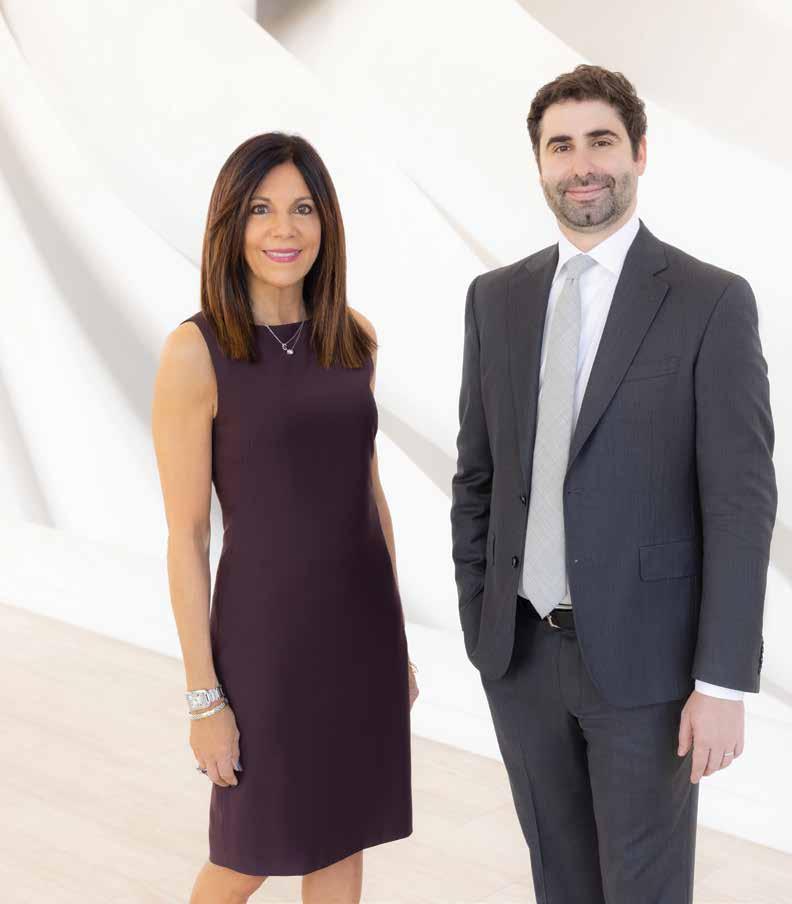
A MODERN APPROACH TO FAMILY MATTERS ®

As a Master Credentialed collaborative attorney with over 30 years of family law experience, Carla Calabrese is the go-to lawyer for Collaborative Divorce. When handling complicated family matters, a collaborative lawyer’s depth of experience can make or break the case. Carla is one of only a handful of Master Credentialed Dallas lawyers, which gives her clients an edge. Carla also combines her business background with the firm’s Emotionally Intelligent Divorce® services to judiciously guide clients through the most complex and high-pressure divorces.
Strategy-focused and driven, Lee Budner deploys his former big firm commercial litigation experience to excel in high-stakes divorces with millions in controversy. He also possesses the emotional intelligence necessary to effectively handle highly sensitive and contentious custody battles. Lee and his team of litigators handle cases large and small, intent on working tenaciously to drive home successful results for his clients.
October 2022 Dallas Bar Association l Headnotes 15 DALLAS | COLLIN | DENTON | TARRANT | PARK CITIES | PRESTON HOLLOW 214.939.3000| CALABRESE BUDNER.COM
CALABRESE BUDNER.COM FROM THE COURT ROOM TO THE CONFERENCE ROOM
Over 600 CLE programs annually plus 15 free hours of On-Demand CLE for DBA the $100 Less broken down monthly, a DBA membership is only $9 - $20 per month. (dependent buffet Bring your





Did You Know? just
2022 Dallas Bar Association DEI CLE Challenge


The DBA encourages its members to aspire to complete 3 hours of CLE training in the areas of diversity, inclusion, and equity each calendar year. The DBA will recognize members who complete and self-report their 3 hours of DEI CLE by December 31, 2022. Programs that qualify will be identified on the DBA’s online calendar. the to be recognized in the February 2023 Headnotes, in DBA Online, and receive your electronic DEI CLE Challenge badge.
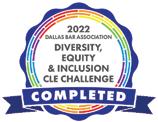


Scan to learn more and report your



16 Headnotes l Dallas Bar Association October 2022
Members can gain exposure through speaking and writing opportunities or DBA members can be licensed in ANY state. Not
Texas.
members. DBA members can join
LRS panel for only
per year –
than $9 per month! When
on license date) Members can develop their careers and leadership skills through specially focused programs. Best lunch
downtown.
colleagues! Coaching and mentoring is offered to attorneys launching their own practices. Committee serving as a DBA or Section officer. Watch for more “DBA Facts” in DBAOnline every Thursday.
Join
Challenge
hours. OCT. 26 10 AM - 2 PM Donation Locations: Arts District Mansion (Hughes & Luce Ballroom) 2101 Ross Avenue, Dallas, TX 75201 Preston Commons (1st Floor Conference Center) 8117 Preston Road, Suite 100 Dallas, TX 75225 Comerica Bank Tower (Carter BloodCare Bus) 1717 Main St, Dallas, TX 75201 Galleria Office Tower II (Carter BloodCare Bus) 13455 Noel Road, Dallas, TX 75240 Schedule your donation at https://linkmix.co/11582142 All donors entered to win a door prize! Hosted by the DBA Community Involvement Committee Access to justice is hard to come by. There is less than one full-time legal services attorney for every 7,100 Dallas citizens living in poverty. That means that if you filled AT&T Stadium to its maximum capacity, you’d have 11 attorneys to service them. And if each client received a single 30-minute session, it would take those attorneys nearly five months of round-the-clock work, with no breaks, just to meet with everyone. That’s where DVAP comes in. DVAP provides access to justice by recruiting, training, and supporting over 1,200 volunteer attorneys each year who take meaningful time from their “day jobs” to provide pro bono legal aid to low-income people in Dallas County. Your support of DVAP will assist low-income people with eviction issues, family law matters, estate planning, bankruptcy filings, veterans benefits, and more. Find out more at dallasvolunteerattorneyprogram.org TOGETHER, WE CAN MAKE A DIFFERENCE.
Look what’s happening at the

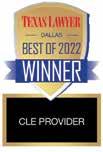



















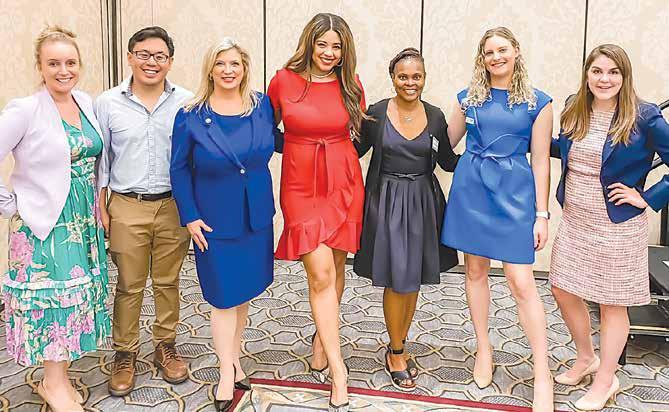

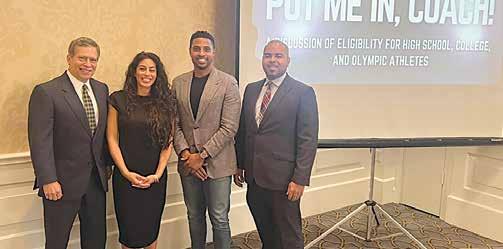

October 2022 Dallas Bar Association l Headnotes 17
DBA! The DBA and DBF have been busy hosting a vari ety of programs, including the DBF’s Collins Clerk ship Luncheon, the SMU Diversity Orientation Lun cheon, the Summer Law Intern Program’s end of the year social, and CLEs such as the Entertainment, Art & Sports Law’s Hybrid program on the topic of “Astro world Aftermath.” We’ve got something for everyone! Join or Renew your dues now at www.dallasbar.org. JOIN NOW & SAVE! All the Best Lawyers Call the DBA home!Join the Dallas Bar Association. DBA MEMBERSHIP Adding value to your career and the profession. + Online Communities 6,950+ members participate in one or more of the DBA online communities. Members 11,000+ DBA members come together to learn, to share, to teach, and to advocate for the profession. Sections 30 practice areas with hundreds of opportunities for networking and professional development. Online Directory 2,500 searches per month for attorneys in the DBA Online Member Directory. Publications 9,300 attorneys and legal professionals read Headnotes each month. Savings $1,000+ estimated savings through DBA membership. 15,000+ attendees at Section CLE, networking and social events.CLE 600 CLE hours offered including... 40 hours of on demand CLE. Mock Trial 1,900+ members and high school students participate in the Texas High School Mock Trial Competition. Pro Bono 12,134 hours of pro bono services by 1,297 volunteer attorneys. DBA MEMBERSHIP What are you waiting for? Join today at DallasBar.org Thank You for voting Dallas Bar Association Best CLE Provider in Dallas We are honored and proud to be chosen as the top CLE provider in Dallas. Founded in 1873, the Dallas Bar Association is dedicated to the continuing education of its 11,000 members. Membership benefits include access to over 400 FREE in-person and virtual CLE courses and 15 hours of FREE on-demand CLE courses each year. Our mission is to serve and support the legal profession in Dallas and to promote good relations among lawyers, the judiciary, and the community. Learn more at DallasBar.org.
BY CLIFFORD NKEYASEN
In Barbara Techs. Corp. v. State Farm Lloyds , the Texas Supreme Court declared that the property insurance claim process is inherently adversarial, and the adversarial process begins as soon as a claim is filed and ends only when the resolution of the claim is finally determined and accepted by the parties.
Typically, the parameters of a property insurance claim are governed by the insurance policy. An insurance policy is a contract that establishes the respective rights and duties to which an insurer and its insured have mutually agreed. An insurance policy, however, is a unique type of contract because an insurer generally has exclusive control over the evaluation, processing, and denial of claims, and it can eas ily use that control to take advantage of its insured. Because of this inher ent “unequal bargaining power,” the Texas Supreme Court has declared that the “special relationship” between an insurer and insured justifies the imposition of a common-law duty on insur ers to deal fairly and in good faith with
their insureds. Thus, an insurer cannot deny or delay payment of a claim absent a reasonable basis to do so.
A claimant must carefully examine the policy to determine what is covered or excluded. However, the typical prop erty insurance policy covers sudden and accidental direct physical loss to the insured premises, other structures, and contents. Named peril policies typically cover fire, lightning, wind, hail, theft, and water damage from a plumbing system or appliance, e.g., burst pipes from the Texas freeze in February of 2021. Under a named peril policy, the loss will not be covered unless it is a specifically identified peril, versus an all-risk policy that covers almost everything unless it is specifically excluded. Most policies exclude coverage for flooding, mold, wear and tear, deterioration, mechanical breakdown, or viruses, such as COVID-19.
The most common issue in first-party property claims is the scope and amount of a covered loss. This will manifest itself in several ways. First, it may involve a partial denial of a claim by the insurer, for example, where the damaged property already had been subject to wear and tear or deterioration. Second, it may involve
a dispute over the dollar amount of the claim where scope is not disputed. Finally, it may relate to a dispute over the scope, but not the value of labor and materials to complete repairs. For example, in a flood claim, the issue may revolve around whether all the wood floors throughout a home must be replaced in order to match undamaged areas.
The insuring agreement in a basic property insurance policy states that payment for a covered loss will be on an actual cash value basis. This equals replacement cost less deduction for depreciation. The replacement cost is limited to the cost of repair or replace ment with similar materials on the same site and used for the same purpose. The payment generally may not exceed the amount actually spent to repair or replace the damaged or destroyed property. Replacement cost valuation does not apply until the damaged or destroyed property is actually repaired or replaced. Beware of deadlines to make a replace ment cost claim, typically one year from the date of loss.
One method of resolving property insurance disputes is to conduct an appraisal. Appraisal is an extra-judicial procedure to determine the amount of the loss. Texas courts have held that appraisal awards made pursuant to the provisions of an insurance policy are binding and enforceable in the absence of fraud, accident, or mistake. State Farm Lloyds v. Johnson, 290 S.W.3d 886, 888 (Tex. 2009). Typically, the parties select
DVAP’s Finest
CHARLES TRUSLOW
Charles Truslow is an Associate with Hunton Andrews Kurth LLP.




Which clinics have you assisted with?
I have mostly accepted cases that come through DVAP’s Eviction Defense Clinic.
Describe your most compelling pro bono case. Many of the eviction cases I see through the Eviction Defense Clinic are compelling, but most recently I was able to represent an elderly woman who dealt with seri ous, ongoing health problems due to complications from COVID-19 that affected her ability to pay rent. She did everything in her power to get rental assistance and work with her landlord, but her landlord proceeded with the eviction anyway, which was improper on a number of grounds. I was able to get her case dismissed. She didn’t have much experience navigating the court system, and was incredibly grateful for the assistance.
Why do you do pro bono?
As a young lawyer, pro bono has been a great way to gain experience with litigation skillsets that often take longer to develop through billable work alone, such as case management, client communication, and oral argument. More importantly, the need for eviction pro bono work in the in the Dallas community is tremendous, especially now in the wake of the pandemic.
What impact has pro bono service had on your career?

Pro bono work has made me a better advocate and afforded me the opportunity to expand my network in the Dallas legal community.


What is the most unexpected benefit you have received from doing pro bono? Doing pro bono often puts things in perspective. It serves as a consistent reminder to be grateful for all the opportunities I’ve been afforded in my life.
A Brief Overview of Property Insurance Claims Tort Practice/Trial Skills 214/748-1234, x2243.
their respective independent apprais ers and if they are unable to agree, an umpire breaks the tie. An appraisal award signed by any two of the threeperson panel is binding as to the amount of the loss.
If the parties are unable to resolve the claim, litigation usually ensues. The Texas Insurance Code creates a private action for damages caused by a person alleged to have engaged in an unfair or deceptive act or practice in the business of insurance or specifically enumerated in § 17.46(b), Business & Commerce Code, as an unlawful deceptive trade practice.
Section 541.060 of the Texas Insur ance Code prohibits a person from engag ing in various unfair settlement practices with respect to a claim. Further, Section 542 of the Texas Insurance Code established a series of procedural deadlines designed to facilitate the timely process ing and payment of claims by insurers.
Section 542.058 requires the insurer to pay the claim within 60 days of receiving all items, statements, and forms reason ably requested or else pay a penalty and reasonable attorney’s fees.
First-party property litigation in Texas continues to evolve through leg islation, new case law, policy amend ments, and endorsements. This article has attempted to cover the broad prin ciples and common themes in first-party property claims practice. HN
 Clifford Nkeyasen is the Managing Member at Clifford K. Nkeyasen, PLLC. He can be reached at clifford@coveragedenied.com.
Clifford Nkeyasen is the Managing Member at Clifford K. Nkeyasen, PLLC. He can be reached at clifford@coveragedenied.com.
18 Headnotes l Dallas Bar Association October 2022
Focus
& Insurance
Pro Bono: It’s Like Billable Hours for Your Soul. To volunteer or make a donation, call
www.dallasbar.org/careercenter Here are some simple tips on how to diversify yourself from the others: 1. Add your objective in the title 2. Add your LinkedIn, Twitter and Facebook links so employers can see your personality 3. Add more accomplishments to show your strengths Thousands of top employers could be looking at your resume right now. The first way to stand out from the other candidates on the DBA Career Center is to update your resume to show the employers why you’re the one they’re looking for. Get noticed! Update your resume on the DBA Career Center today! NEED TO REFER A CASE? The DBA Lawyer Referral Service Can Help. Log on to www.dallasbar.org/lawyerreferralservice or call (214) 220-7444. Let's Keep it Social. Follow us! Facebook Instagram TLinkedIn witter Find out what's going on at #DallasBarAssoc
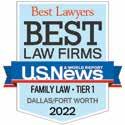
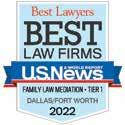
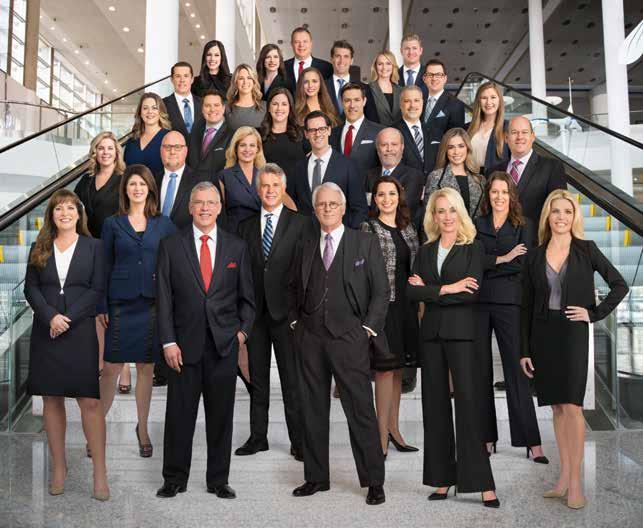 KOONSFULLER NORTH TEXAS TEAM
KOONSFULLER NORTH TEXAS TEAM
October 2022 Dallas Bar Association l Headnotes 19
D A L L AS * * | 1717 McKinne y Avenue, Suite 1500 | Dallas, Texas 75202 | 214.871.2727 D ENTO N | 320 West Eag le Drive, Suite 200 | Denton, Texas 76201 | 940.442.6677 P L A N O | 5700 W Plano Parkway, Suite 2200 | Plano, Texas 75093 | 972.769.2727 SO U TH L AK E | 550 Reser ve Street, Suite 450 | Southlake, Texas 76092 | 817.481.2710 *Board certified in family law by the Texas Board of Legal Specialization. **Principal office. K OO NS FU LL E R : DIVORCE, CHI L D CU S TOD Y , POS T D I V O R CE M O D I F IC A TIO NS , CHIL D S UPPO R T , MAR I T A L P R OPE R T Y AG R EEME N TS, ENFORCEME N TS, G RAND P A RENTS’ RIGHTS, P A TERNIT Y , CO L L A BOR A TIVE L A W , A ND A PPEA L S LEFT TO RIGHT: R1: Heather King,* Rick Robertson,* Ike Vanden Eykel,* Charla Bradshaw,* Liz Porter* R2: Jessica Janicek,* Brian Loughmiller,* Neda Garrett,* Julie Crawford* R3: Laura S. Hayes,* Sean Abeyta,* Dana Manry,* Chris Meuse,* Fred Adams,* Sally Pretorius,* Rob McEwan* R4: Jessica Perroni,* Kevin Segler,* Courtney Walker, Deron Sugg, Jonathan Bailey, Lauren Shaw R5: James Logue, Lauren Harris, Lindsey Vanden Eykel, Taylor Joeckel, Paul Leopold R6: Spenser Housewright, Sarah Cary, Drew Williamson R7: Tom Daley,* Justin Whiddon
BY GEORGE L. LANKFORD
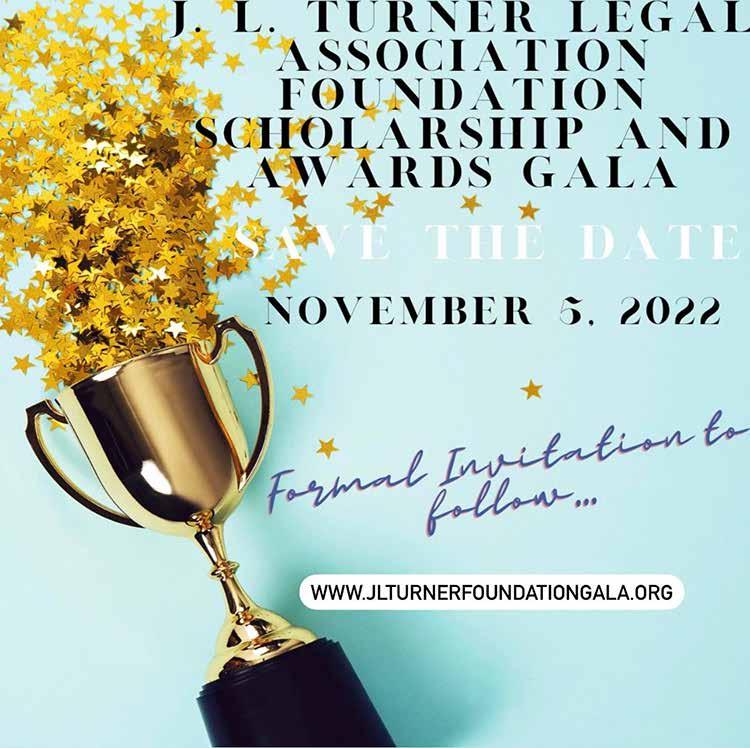
Moreno v. Sentinel Ins. Co., 35 F.4th 965 (5th Cir. June 2, 2022) is a recent example of the rule in insurance liabil ity coverage, “an insurer has no duty to defend and no liability under a policy unless and until the insured in question complies with the notice-of-suit condi tions and demands a defense.” (under line added.) “In other words, despite having knowledge and opportunity, an insurer is not required to simply interject itself into a proceeding on its insured’s behalf.” The 5th Circuit of Appeals recognized that the following facts and chronology did not meet the insured’s burden of compliance with the policy conditions.

Moreno fell from a ladder while painting a home. He was badly injured. Beazer Homes (Beazer) was the home builder. N&F Painting (NF) was the painting contractor. Sentinel Insurance Co. (Sentinel) insured NF Beazer was an “additional insured” on the Sentinel policy pursuant to contract.

Moreno sued both NF and Beazer. NF
did not contact Sentinel about the law suit. Its owner believed there was no cov erage because Sentinel was an employee. Beazer did contact Sentinel by mail, and also provided a copy of Beazer’s letter to NF stating, “DEMAND AND TENDER FOR DEFENSE AND INDEMNITY” and requested NF’s carrier defend and indemnify it. Sentinel reached out to NF’s defense counsel (Flores) to confirm if attorney Lopez was defending Beazer. Receiving no reply, Sentinel reached out to NF’s owner (Flores) for the same infor mation. Flores said Sentinel should con tact NF’s defense counsel and obtain any paperwork. He further stated NF did not believe there was any coverage since the suit alleged Moreno was an employee, so they did not report the suit to Sentinel. Sentinel then sent a letter to Beazer agreeing to unconditionally defend and indemnify Beazer.
Sentinel requested that NF’s counsel forward the state court petition. Initially he forwarded NF’s Answer and discovery responses, and then later he forwarded the petition. He never requested a defense or indemnity from Sentinel. Sentinel sent a
letter to Flores and NF defense counsel disclaiming coverage for NF.
Moreno then settled with Beazer and dismissed them. Moreno then amended his petition to allege Moreno was “an independent contractor.” NF never for warded this amended petition to Sentinel.
The case went to a bench trial. The court entered a judgment that, among other things, held Moreno was an inde pendent contractor, NF placed Sentinel on proper notice, and Moreno was entitled to $1,627,w541.35 from NF, plus interest and costs. Neither NF, its owner, nor its defense counsel summited this Judgment to Sentinel, nor ask for cover age or a defense “in connection with the Agreed Judgment.”
Moreno then filed sued against Sen tinel as a third-party beneficiary to the policy. Sentinel and Moreno filed cross motions for summary judgment. Moreno argued that Sentinel was collaterally estopped from denying the underly ing court’s specific finding that Moreno was an independent contractor. The evidence established he was not an employee.
The federal trial court rejected the collateral estoppel arguments because it could not be shown that the “relevant facts” were “actually litigated” by true adversaries, and that they were essential to the judgment. The court then went on to hold that NF had not satisfied the notice requirements in the policy and had failed to demand a defense. Thus, Sentinel had not breached its policy. This appeal then followed.
The 5th Circuit held that the judg ment of the district court in the sub sequent coverage dismissing Moreno’s
claims against Sentinel with prejudice was affirmed. “Moreno’s arguments on appeal do not convince us that the district court erred in concluding that Sentinel’s duty to defend NF Painting was never triggered, and thus was not breached, because NF Painting never sought a defense from Sentinel against Moreno’s personal injury claims. That another insured, Beazer Homes, noti fied Sentinel of the suit against it and demanded a defense by Sentinel, as NF Painting’s insurer, did not obligate Sen tinel to also undertake NF Painting’s defense.”
The 5th Circuit then specifically held that NF’s eventual transmittal of the suit papers did not trigger the duty to defend because, “there is no indication that Lopez’s transmittal of a copy of the petition to [Sentinel], solely in responses to [Sentinel’s] request, expressed anything more than profes sional courtesy.” NF never asked for a defense or indemnity, and most impor tantly, NF never discussed or forwarded the underlying judgment or findings to the carrier.
“In short, the undisputed facts before us show that NF Painting chose, with the assistance of counsel, to handle Moreno’s personal injury claims in its own way, without involving Sentinel in its defense, as it was entitled to do. And Moreno [in the coverage suit] has put forth no evidence suggesting that Senti nel was not entitled to rely on that deci sion.” HN
George L. Lankford is a Member Attorney at Fanning, Harper, Martinson, Brandt & Kutchin, P.C. He can be reached at glankford@fhmbk.com
20 Headnotes l Dallas Bar Association October 2022
A Lesson in Managing Liability Insurance Claims Focus Tort & Insurance Practice/Trial Skills Need Help? You’re Not Alone. More resources available online at www.dallasbar.org/content/peer-assistance-committee Texas Lawyers’ Assistance Program…………...(800) 343-8527 Alcoholics Anonymous…………………………...(214) 887-6699 Narcotics Anonymous…………………………….(972) 699-9306 Al Anon…………………………………………..…..(214) 363-0461 Mental Health Assoc…………………………….…(214) 828-4192 Crisis Hotline………………………………………..1-800-SUICIDE Suicide Crisis Ctr SMU.…………………………...(214) 828-1000 Metrocare Services………………………………...(214) 743-1200 Education Law Study Group Does your practice entail school or education law? Would you be interested in participating in a DBA Education Law Section to connect with others in this practice area and where CLEs will be presented on education law topics? If so, email Sandy Lauro (sandra@slauro.com) who is assisting the DBA to create an Education Law Section.



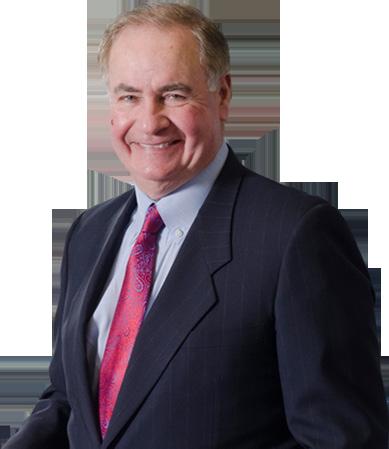
October 2022 Dallas Bar Association l Headnotes 21
Tips Practice
On November 1, 2022, I will begin my 10th year practicing law. Being a lawyer is an exciting, fulfilling adven ture full of ups and downs. In the spaces between—perhaps because of them—I have grown as a lawyer and as a per son. Over the last (almost) 10 years, I have kept a long list of lessons I have learned from being a trial lawyer. What follows are simply the “greatest hits.” I thank the people who taught me these lessons, mentored me over the years, and helped me grow as a person and as a trial lawyer. I hope these lessons help you maintain perspective, find confi dence in your work, and experience joy in your heart.
Reach Out
Every problem can be solved if you tell someone and ask for help. Both person ally and professionally, you will solve your problems and make it through to the fin
ish if you reach out to your mentor, your friend, or your family.
Do Not Confuse Inexperience with Inability
You can do the hard assignment. You can argue the complex motion. You can try that case. Years of experience do not dictate your true potential as an advocate.
Ask for the Ball
You will only learn to be the best advocate if you seek out opportunities to be the best advocate. Ask for the ball with three seconds left in the game to score the winning basket. If you miss, you miss—and you will grow. But you will never grow if you do not ask for the ball.
Do Not Let [X] Mean More than [X] Really Means
Things happen in your career. There
are critical issues that can rock your per sonal and professional life. Most, though, are not catastrophic events. Maintain ing perspective—in both defeat and vic tory—breeds perseverance and empathy.
Focus on the Road Not the Wall
In NASCAR, the best drivers do not build their race-winning strategies solely around how to avoid hitting the sidewall. Likewise, as a lawyer, you should consider all aspects of a decision and not allow minor or remote negatives stop you from taking reasoned action. Focus on winning the race.
Take Vacations
There is nothing magical here. You need rest to be the best lawyer and person you can be. Your clients will still be there when you get back.
Productivity is Doing What You Intended
that client. You know that case. Avoid ing them will not make them go away. Avoiding them will likely make them worse. Take those calls and speak hon estly. Either your issue will get resolved, or you will be better prepared to resolve your issue in the future. Hiding from issues resolves nothing.
If You Are Afraid to Do It, Do It Right Now
Learning and growing never stop. But at a certain age, we can become comfort able—even complacent. We can think that if something scares us, it must mean we should not do it. That is generally not true. Every time you confront your fear, you grow in strength and confidence. Every time you cede control to your fear, it festers, and you feel worse. Proactively control your fear. And, to overcome your fear, do the thing that scares you—right now.
Part 1: October 20, Noon-1:30 p.m. via Zoom Lisa Tomiko Blackburn
BY ANDY JONES DEI Ethics 1.50 | Register at dallasbar.org.
HONORING DIVERSITY: ADDRESSING MICROAGGRESSIONS THE WORKPLACE Allied Bars Minority at www.dallasbar.org
You can do a lot of nothing in a day and feel a false sense of productivity. True productivity is accomplishing what you intend to accomplish each day, each week, each month. Do not confuse being busy with actually getting stuff done.
While those are lessons learned over my first 9 years of practice, year 10 is still ahead of me, but I know it will also be filled with lessons. From raising my kids to trying cases to other large and small moments, I am going to learn a lot. I am open to those growth opportunities. They will make me the lawyer and the person I want to be. I hope your year is full of les sons that help you become the lawyer and person you want to be, too. HN
Part 2: October 27, Noon-1:30 p.m. via Zoom Cassie J. Dallas, Lisa Tomiko Blackburn, D.Ryan Nayar, Kenya Scott Woodruff
Always Pick Up the Phone
You know that person. You know
VOTE NOW! DALLAS COUNTY COURT STAFF AWARDS

The Dallas Bar Association Judiciary Committee developed these awards to encourage court staff to do their personal best. This year, the awards will recognize the court staff team (court clerks, court coordinator, bailiff, etc.) that has consistently demonstrated a friendly and polite attitude, helpfulness, professionalism, and spirit of cooperation. Awards will be presented at the DBA Awards Luncheon in November to court staff teams in each of the following categories:
•Dallas Appellate Courts • Dallas Civil District Courts • Dallas County Courts at Law • • Dallas Criminal District Courts • Dallas County Criminal Courts • Dallas Family Courts • • Dallas Probate Courts •
For questions, contact lhayden@dallasbar.org. Deadline to vote October 14. Visit: tinyurl.com/2022courtawards to vote.
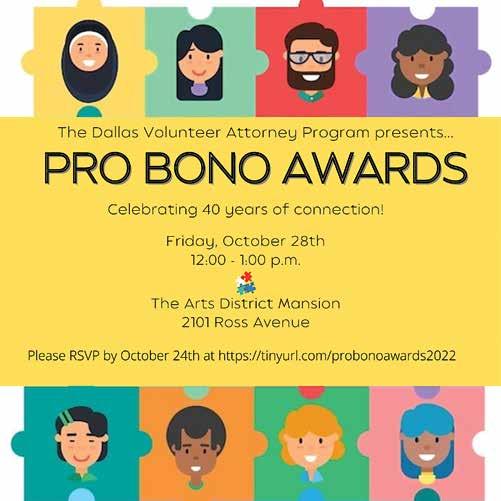 Andy Jones is the President of the Dallas Association of Young Lawyers and a Trial Lawyer at Sawicki Law. He can be reached at ajones@sawickilawfirm.com.
Andy Jones is the President of the Dallas Association of Young Lawyers and a Trial Lawyer at Sawicki Law. He can be reached at ajones@sawickilawfirm.com.
22 Headnotes l Dallas Bar Association October 2022
from (Almost) 10 Years of
DBA WE LEAD WOMEN EMPOWERED TO LEAD APPLY NOW! DBA WE LEAD (Women Empowered to Lead in the Legal Profession) is a leadership program designed to address the challenges of high-performing women who have practiced law for 8 to 15 years. WHO DBA WE LEAD is accepting applications from women lawyers who graduated from law school between 2007 and 2014, have established themselves in their careers and communities, and want to further explore advancement opportunities and leadership skills. WHEN DBA WE LEAD runs from February 2023 to November 2023 and includes four half-day sessions with mandatory attendance. Cost: $1,000 Application Deadline: December 1, 2022 Need-based scholarships are available For information and online application visit: www.tinyurl.com/2023DBAWELEAD Questions? Contact Judi Smalling at jsmalling@dallasbar.org. Each program offers
IN
Sponsored by the
Equality and
Participation Committees Register
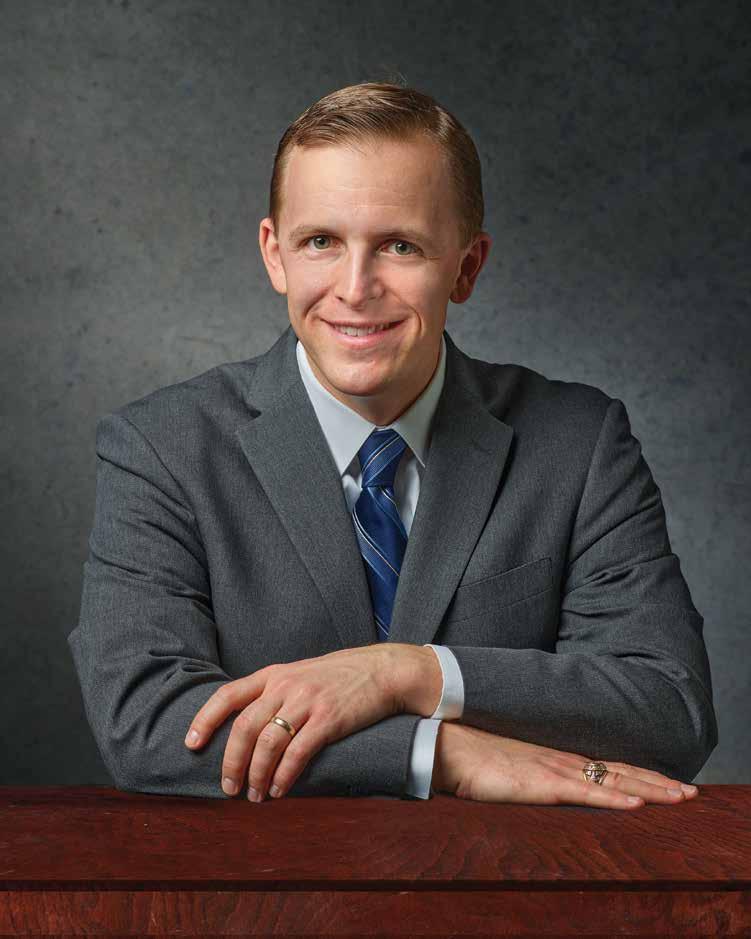
October 2022 Dallas Bar Association l Headnotes 23 catastrophic injuries | medical malpractice | wrongful death #ForThePlaintiffForThePeople ANDY JONES FIGHTING FOR EVERY CLIENT, EVERY DAY.
The fourth year of the Dallas Bar Association’s Entrepreneurs in Com munity Lawyering (ECL) program wel comed seven attorneys launching solo practices aimed at helping everyday people.
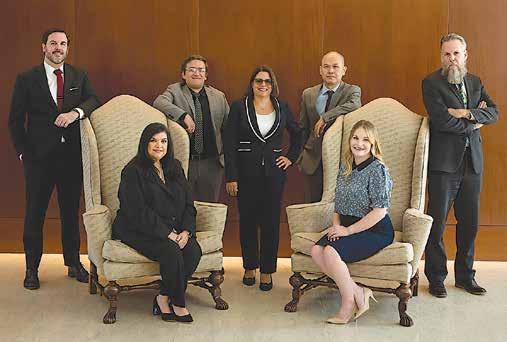

“I am excited to begin the fourth year of the program,” ECL Director, Saedra Pinkerton , said. “By providing these aspiring entrepreneurs with men toring, business development train ing, access to practice management resources and one-on-one coaching, we help them lay a solid foundation.”
A practicing attorney for 30 years, Rebecca Alcantar joins ECL as a Fellow Member. Alcantar is ready to make the leap to solo practice so she can choose the people and causes she fights for.
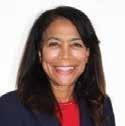
“I cannot imagine being in the shoes of someone who does not have resources or is disenfranchised – an immigrant, a child, or someone who has been abused,” Ms. Alcantar said. “These people do not have the knowl edge to navigate the legal system. Since I am a civil litigator, I can (help).”

Inspired by the idea of supporting the profession while expanding access to justice at the same time, Laura Benitez Geisler brought the incubator model to the DBA during her year as president of the organization.
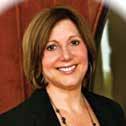
Geisler structured the program to require 200 hours of pro bono service from each of the participating attor neys during the program year.
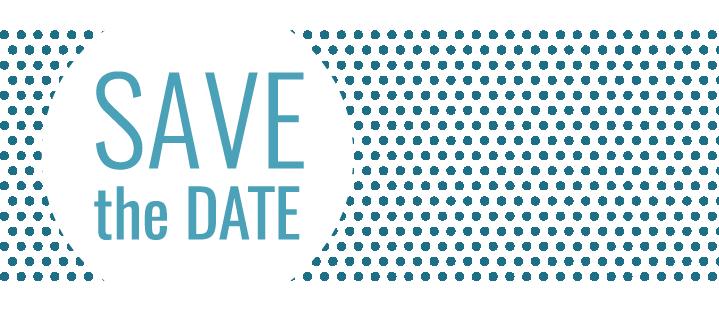
“Our ECL attorneys have provided thousands of hours of pro bono service in the community,” Ms. Pinker ton said. “They have helped countless people with housing issues, child cus tody, probate, and more. Our attorneys
work closely with the Dallas Volunteer Attorney Program, Catholic Charities, and other local organizations.”
Following his remarkable service in the United States Air Force and the Texas Air National Guard, incoming ECL member Kelly Carter is ready to turn his focus in a more local direction.
“My life’s goal is to be an asset to my community through public service,” Carter said. “I have reached the point in my personal and professional growth that I need to create my own pathway to serve the public. I want to select the missions and focus on alleviating the problems that I think are most pressing in the community.”
Attorney Laura Martinez , who has practiced in Texas and Puerto Rico, shares similar goals in creating her immigration practice.
“The mission of my office will be to enable foreign nationals to over
come any immigration-related obstacle by effectively delivering high quality, accessible and competent legal repre sentation at a fair price,” Ms. Martinez said.
Morgan Ambrust went to law school in California with the intention of working there as a public defender. But when her husband’s job brought them to Dallas last year, she had to pivot.
“I am from a family of entrepre neurs, and I would say that running a business is in my blood,” Ambrust said. “While I never imagined having my own firm—I planned to be a public defender in California because that was really the only way to consistently rep resent indigent clients—since moving to Texas and recognizing how few pub
lic defender positions there are, I knew I had the chance to be the entrepreneur I was raised to be and represent the clients I have a passion for—a win/win in my book.”
UNT Dallas College of Law gradu ate, Jon McCurley , is ready for the independence of running his own prac tice.
“I want to have a solo practice to have the personal freedom to take the cases that interest me and meet the needs of underserved people,” McCur ley said.
New ECL member Yubin Ding plans to incorporate a pricing structure that everyone can afford.

“I will serve underrepresented, lowand moderate-income members of the community in a few ways,” Mr. Ding said. “I will set my fee schedule within a reasonable range and make my ser vices affordable for more people who need legal services but cannot afford too much.”
Recent Texas A&M University School of Law graduate Taylor Matthews is joining the program while he awaits bar results, with the intention of being ready to launch on day one of his licensure.
“I want to start and run my own business because doing so has been my ambition for a long time, Mr. Matthews said. “I want the personal responsibility … (to) build a firm and a reputation I can take pride in, and foster a healthy, productive work environment for both myself and any staff I am fortunate enough to bring on.”
To reach the ECL program attor neys or Saedra Pinkerton, e-mail ecl@ dallasbar.org.



24 Headnotes l Dallas Bar Association October 2022
Entrepreneurs in Community Lawyering Class of 2022 STAFF REPORT DBA Allied Bars Equality Committee Signature Event & Privilege Walk Tuesday, October 25 Social Event - 5:30 p.m. Program Start - 6:00 p.m. at the Arts District Mansion MCLE Pending Learn more & RSVP at DallasBar.org Where do we go from here? Join us for an interactive evening as we explore our own barriers and privileges and how we can more intentionally tackle diversity, equality, and inclusion in the legal profession. SAVE THE DATE DBA PUBLIC FORUM NOV 15 NOON - 1:00 PM ARTS DISTRICT MANSION CULTURAL COMPETENCY: PUBLIC & PRIVATE PERSPECTIVE Jane McBride Optimus Legal Management and Consulting Mey Ly-Ortiz Toyota Legal One Jane Howard Martin Toyota Legal One Moderator Speakers MCLE: 1.00 DEI Ethics (pending) Co-sponsored by: Public Forum Committee Allied Bars Equality Committee DBA Corporate Counsel Section Association of Corporate Counsel Scan to RSVP N E W L E G A C Y C L U B F O R E M E R I T U S M E M B E R S All Emeritus members (licensed 50+ years) are invited to make an optional $100 gift to support the DBA and its programs In addition to a free Emeritus membership, Legacy Club members receive special recognition in Headnotes, on the DBA website, and at the Annual Meeting E m e r i t u s M e m b e r s s h o u l d r e c e i v e t h e i r 2 0 2 3 r e n e w a l s t a t e m e n t s b y m a i l a r o u n d O c t o b e r 1 2022 ECL Class
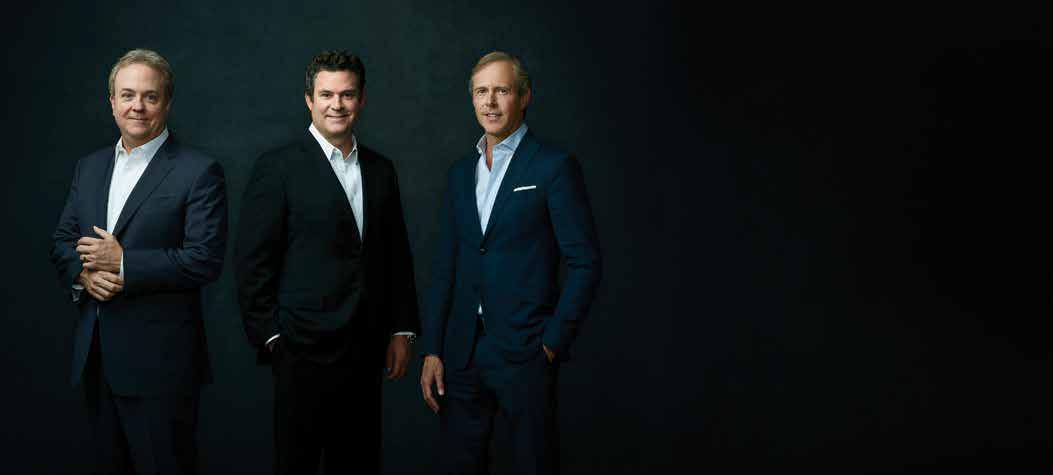

October 2022 Dallas Bar Association l Headnotes 25 But that comes with the territory when you retain one of the region’s most effective and accomplished personal injury firms. For over 25 years, we’ve worked relentlessly to help personal injury victims secure the justice they deserve, while actively spurring changes to make our world safer. If you know someone who is a victim of a catastrophic personal injury matter, visit paynemitchell.com to make a referral or to find out more about our notable results. OUR CLIENTS OFTEN GET CALLED NAMES IN COURT, LIKE COMPENSATED, VINDICATED + AWARDED. 214.252.1888 • paynemitchell.com AVIATION CRASHES • PRODUCT DEFECTS • NEGLIGENCE MEDICAL MALPRACTICE • VEHICLE COLLISIONS Left to right: Jim Mitchell, Andy Payne, Todd Ramsey PMR Firmad2022_Headnotes_021422.indd 1 2/23/22 11:04 AM
What You Need to Know in Drafting Settlement Documents
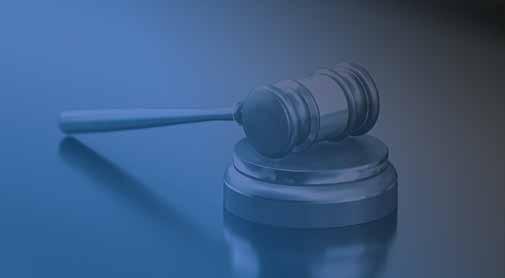 BY JODY RODENBERG
BY JODY RODENBERG
In July 2022, the Professional Ethics Committee for the State Bar of Texas issued Opinion No. 694 that addressed whether it was “a violation of the Texas Disciplinary Rules of Professional Con duct for a Plaintiff’s personal injury law yer to agree as part of the settlement to personally indemnify and hold harmless the Defendant, the Defendant’s lawyer, or the Defendant’s insurer from medical liens and reimbursement claims.”
Statement of Facts
Opinion No. 694 analyzed a com mon fact pattern recognized by lawyers who practice in any aspect of personal injury litigation. Plaintiff is injured and Medicare paid most of their medical and hospital bills. Plaintiff sues Defen dant. Defendant’s insurance company hires a lawyer for Defendant.


The case settles. As part of the set tlement, the parties agreed Plaintiff would have responsibility for satisfy
ing all liens and reimbursement obli gations. The parties further negotiated that Plaintiff would “indemnify and hold harmless Defendant, Defendant’s lawyer, and Defendant’s insurance car rier for any claims brought against them for reimbursement.”
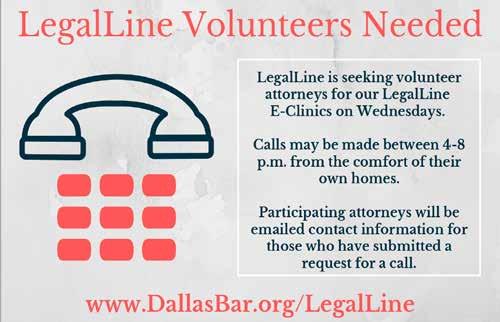
In drafting the settlement docu ments, the Defendant’s lawyer includes language that Plaintiff’s lawyer would also “personally indemnify and hold harmless the Defendant Group against any claims asserted by any lienholders and reimbursement claimants.” Defendant’s lawyer insisted this was a condition of the settlement, as “Plaintiff might no longer have funds sufficient to satisfy Plaintiff’s indemnity agreement…”
Discussion
The Committee recognized this situ ation effectively “makes the Plaintiff’s lawyer a “personal guarantor of the cli ent’s debts,” and concluded that such an agreement would in fact violate the Texas Disciplinary Rules of Professional
Conduct. The Committee found that such an agreement implicates four sepa rate rules.
Rule 1.08(d)(1)
Rule 1.08(d)(1) explains that law yers cannot provide financial assis tance to clients other than for advanc ing or guaranteeing court costs, expenses of litigation, and reasonable and reasonably necessary medical and living expenses. Providing financial assistance to a client in the form of an indemnity agreement goes beyond the payments allowed by Rule 1.08(d)(1). The purpose of the indemnity agree ment would be to protect the Defen dant Group in event the event of a post-settlement claim.
Rule 1.06(b)(2)
A personal indemnity agreement by the Plaintiff’s lawyer also creates a potential conflict of interest prohibited by Rule 1.06(b)(2). It requires “the law yer to decide whether to accept personal liability for the client’s debts.” Further, this type of demand of personal indem nity may adversely limit a lawyer’s rep resentation if the Plaintiff agrees to the settlement terms and the Plaintiff’s
attorney refuses the offer or attempts to dissuade the client from settlement to protect the lawyer’s own interests.
Rule 2.01
A lawyer’s duty to exercise indepen dent professional judgment may also be impacted for the same reasons. A personal indemnity agreement by the Plaintiff’s lawyer may prevent the law yer from exercising independent judgment because it exposes the Plaintiff’s lawyer to material personal risk.
Rule 8.04(a)(1)
Unsurprisingly, Rule 8.04(a)(1) prohibits a lawyer from knowingly inducing another lawyer to violate the Rules. Since the “Rules do not per mit a plaintiff’s lawyer to agree to personally indemnify and hold harmless a defendant or its lawyers or insures against further reimbursement claims,” a Defendant’s lawyer will violate Rule 8.04(a)(1) if the lawyer knowingly induces a Plaintiff’s lawyer to enter such an agreement.
HN
Jody Rodenberg is a Partner at Sommerman, McCaffity, Quesada & Geisler, LLP. She can be reached at jrodenberg@ textrial.com.
From the Bench
RENÉE HARRIS TOLIVER
U.S. Magistrate Judge, U.S. District Court for the North ern District of Texas, Dallas Division
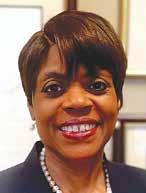

Why did you decide to become a Judge?
It was never anything I thought about until well into my career as a trial lawyer. I thought I’d be good at it and believed my ample trial and appellate experience, as well as good temperament, made me well qualified. I’m just glad the merit selection panel and the district judges agreed!
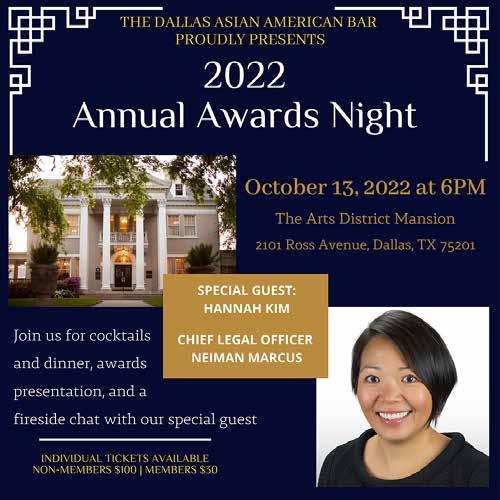
Also, I have always believed it important that every aspect of government reflect the people it serves, including the judiciary. Before my appointment, there had never been an African American magistrate judge in this district. Indeed, I’m told that I am the only African American magistrate judge in the state and have been for nearly all my tenure. I hope that changes soon.
Why do you participate in Bar programs?
It’s so important to be a part of the legal community, and it’s through Bar programs that I have that opportunity. I see it as chance for me to not only get to know fellow Bar mem bers, but for them to have a chance to get to know me. It was especially important to me following my appointment 12 years ago, since I am a Fort Worth native and most of my legal practice and bar involvement before then was in Tarrant County. Because federal court is relatively formal and the federal judicial ethics rules are very strict, there aren’t many other opportunities to demonstrate that we (judges) are approachable and human.
What are you currently reading?
While Justice Sleeps by Stacey Abrams. I love fiction, particularly a good whodunit! Before that, it was The Sweetness of Water by Nathan Harris.
Fun fact about you:
When I was a kid, I played five different instruments: piano, organ, violin, clarinet, and flute (picked them up in that order). Unfortunately, musical ability (no natural talent here!) is not like riding a bike, and after decades without practice, I’ve lost those skills.
26 Headnotes l Dallas Bar Association October 2022
Column Ethics

October 2022 Dallas Bar Association l Headnotes 27
As a trial approaches, attorneys work tire lessly to transform months—if not years—of work into a final strategy to prevail on the merits. Depositions are designated, exhibits marked, demonstratives created, and wit nesses prepared. These efforts are undoubt edly important, valuable, and necessary to secure the best outcome for the client. Yet in the days and weeks immediately preceding trial, precious time and resources are often directed toward contentious pretrial disputes rather than the more-important task of finetuning one’s case. This article seeks to lay the groundwork for establishing relationships and credibility with opposing counsel, to create a more collaborative pretrial process that ultimately allows more attention to be directed toward trial preparation.
Adversarial Mindset;
Collegial Interactions
Trial is by nature adversarial, and your



client’s needs are your priority. However, an adversarial mindset should not preclude professional or even collegial interactions between counsel. Starting off on the right foot can pay dividends throughout the life cycle of a case, ultimately serving the inter ests of your client. Consider the common practice of consenting to reasonable requests for extensions—showing flexibility from the start better ensures flexibility from opposing counsel later on.
A few other practices may encourage a working relationship with opposing counsel: agreeing on the preservation of objections in depositions; avoiding unilaterally setting hearings (where possible); and leaving ade quate time to confer on discovery disputes. Rather than a sign of weakness, proactively establishing mutual respect and trust with opposing counsel is a pathway to efficiency, as attention can be directed toward core issues rather than procedural disputes. It also can save clients significant fees and costs when you avoid unnecessary motion practice and discovery disputes. The same reasons that parties agree to discovery protocols and
protective orders also apply when seeking to reach agreements later in the life of a lawsuit. Reducing procedural and administrative burdens in a mutually beneficial way has utility at all stages of litigation, even during trial.

Communication
As in most relationships, effective com munication is key to maintaining trust and rapport. Things like tone, timing, and courtesy go a long way in cultivating a healthy working relationship with opposing counsel. While an aggressive approach can at times be warranted, a more collegial tone—where appropriate—may encourage cooperation. In addition, consider the effects of positive reinforcement—communicating your appre ciation may influence opposing counsel to repeat beneficial behavior. And even choos ing when to communicate can be impor tant—avoiding unnecessary e-mails when you know opposing counsel is unavailable (in trial, on vacation, etc.) can garner appre ciation and respect. A variety of communi cative efforts can establish a positive rela tionship with opposing counsel and lead to more effective negotiations and cooperation.
Pretrial Payoff
Cultivating mutual respect and trust with opposing counsel early on in a case provides a good foundation for reducing pretrial work load by making opposing counsel more likely to enter into stipulations and agreements. For example, agreeing to the admissibility of exhibits obviates the need to argue iterative objections prior to trial, and prevents disrup tions caused by proving up documents dur ing trial. Other examples include: (i) agree ing when to exchange “live witness” lists; (ii)
agreeing to notify opposing parties of the order in which witnesses will be called the night before each trial day, (iii) agreeing to argue exhibit objections categorically as opposed to individually; and (iv) reaching agreements regarding the exchange of final deposition designations and demonstrative exhibits.
Finding the Right Balance
To be sure, not all of the examples discussed are appropriate for every case. The proper balance will likely fall somewhere between what is sometimes referred to as a “trial by agreement,” and a battle over each and every exhibit. And while pretrial agree ments allow more time to prepare the merits of the case, there will certainly be impasses warranting a more adversarial approach. For example, certain exhibits may be highly objectionable, and there may be grounds to strenuously advocate for an opposed motion in limine
To be clear, we do not suggest mak ing agreements merely to be agreeable or to avoid conflict. Reaching agreements to streamline litigation is a two-way street— an uncooperative opposing counsel may not warrant flexibility on your end. But diminishing procedural hurdles through agreement—where appropriate—can lead to additional time and resources available to gain an edge where it matters most. Par ties are best positioned to do so when they have laid a foundation upon which such agreements can be built by cultivating rela tionships from a lawsuit’s beginning. HN
Mike
Robert Browne Reilley
S. Theis Rice
Trinity Industries, Inc.
Michael L. Riddle
Middleberg Riddle Group
Mark J. Siegel
Law Offices of Mark J. Siegel, P.C.

Darryl J. Silvera
The Silvera Firm
Damon D. Tanck
Watson Law Group, PLLC
Peter S. Vogel
Peter S. Vogel, PC
Hon. Ingrid Warren
Dallas County

Probate Court No. 2
As of September 7, 2022
John Sullivan, Jackson Smith, and Alex Wolens are attorneys at Winston & Strawn LLP, and would like to thank Tom Melsheimer for his advice and input regarding this article. They can be reached at jsullivan@winston. com, jacsmith@winston.com, and awolens@winston.com, respectively.
28 Headnotes l Dallas Bar Association October 2022 Randolph D. Addison Addison Law Firm P.C. Micah Adkins The Adkins Firm, P.C. Carmen Blankenship Law Office of Carmen Blankenship Mary B. Campbell Law Office of Mary B. Campbell David Carlock Carlock & Gormley J.Scott Chase Farrow Gillespie Heath Witter, LLP Wm. Kevin Cherry Cherry Petersen Landry Albert LLP William Cox Cox Jordan LLC David A. Eldridge Law Office of David A. Eldridge Al Ellis Sommerman, McCaffity & Quesada & Geisler L.L.P. Stephanie Elovitz Gary Fish Texas Retina Associates Knox Fitzpatrick Knox Fitzpatrick PC William A. Galerston Iola Galerston, LLP David L. Godsey Godsey Martin, P.C. Hon. Bonnie L. Goldstein Fifth District Court of Appeals Krista Hanvey James J. Hartnett, Jr. The Hartnett Law Firm Christina Heddesheimer Dentons US LLP Kathleen E. Irvin Attorney at Law Kristina N. Kastl Kastl Law, P.C. Sang Eun Lee Greenberg Traurig, LLP Douglass List Banner Legal Servics, P.C. Ron MacFarlane The MacFarlane Firm, P.C. Joshua Mahaffey Daryl Flood, Inc. Samuel Mallick Haynes and Boone, LLP Justin Martin Godsey Martin, P.C. Sawnie A. McEntire Parsons McEntire McCleary PLLC Mike McKool McKool Smith P.C. Nancy A. Nasher NorthPark Development Company Robert H. Osburn Law Office of Bob Osburn Roy Powell Jones Day Ellen S. Pryor UNT Dallas College of Law Glynis W. Redwine G.Redwine, PLLC Angel L. Reyes, III Reyes Browne Reilley S.Theis Rice Trinity Industries, Inc. Michael L. Riddle Middleberg Riddle Group Sydney Sadler Crawford, Wishnew & Lang PLLC Charles Shewmake Holland & Knight LLP Darryl J. Silvera The Silvera Firm Jay Spring Quilling, Selander, Lownds, Winslett & Moser, P.C. Damon Tanck Watson Law Group, PLLC Peter S. Vogel Foley & Lardner LLP Hon. Ingrid Warren Probate Court No. 2 2022 Sustaining Members of the Dallas Bar Association The DBA sincerely appreciates the support of its Sustaining Members whose financial contributions enhance the preservation of the historic Arts District Mansion, Home of the Dallas Bar Association. Randolph D. Addison Addison Law Firm P.C. Micah Adkins The Adkins Firm, PC Carmen Blankenship Law Office of Carmen Blankenship Mary B. Campbell Law Office of Mary B. Campbell David Carlock David Carlock, P.C. Wm. Kevin Cherry Cherry Petersen Landry Albert LLP David A. Eldridge Law Office of David A. Eldridge Al Ellis Sommerman, McCaffity, Quesada & Geisler, L.L.P. Stephanie Elovitz Munck Wilson Mandala, LLP Gary Fish Texas Retina Associates Knox Fitzpatrick Knox Fitzpatrick PC William Galerston Iola Galerston, LLP J. Richard Gallagher Law Offices of J. Richard Gallagher David L. Godsey Godsey - Martin, P.C. Haley Grissom Caldwell Cassady & Curry Krista Hanvey Gibson, Dunn & Crutcher, LLP James J. Hartnett, Jr. The Hartnett Law Firm Christina Heddesheimer Dentons US LLP Eric Hinton Southern Methodist University Houston E. Holmes, Jr. Attorney at Law John K. Horany John K. Horany, P.C. Kathleen E. Irvin Attorney at Law Kristina N. Kastl Kastl Law, P.C. Sang Eun Lee Greenberg Traurig, LLP Ron MacFarlane The MacFarlane Firm, PC Joshua Mahaffey Brown Fox PLLC Justin Martin Godsey - Martin, P.C. Kathleen Martinez Law Office of Vickie M. Alexander Stewart D. Matthews S.D. Matthews & Associates, PLLC Sawnie A. McEntire Parsons McEntire McCleary PLLC
McKool McKool Smith P.C. Nancy A. Nasher NorthPark Development Company
H. Osburn Law Office of Bob Osburn Roy Powell Jones Day Ellen S. Pryor UNT Dallas College of Law Glynis W. Redwine G Redwine, PLLC Angel L. Reyes, III Reyes
Laying a Foundation for Streamlined Pretrial Proceedings BY JOHN SULLIVAN, JACKSON SMITH, AND ALEX WOLENS Texas HS Mock Trial Needs Volunteers! Coach a Team Help team prepare for competition Schools located in Dallas • No litigation experience required • Work around your schedule! HOW YOU CAN HELP Score a Competition Earn self-study CLE & network with attorneys No litigation experience required • Only 3 hour time commitment • It takes over 200 attorneys to score a day of competition! We need you! 2023 Competitions: Sat, January 21, Sat, January 28, Sat, February 4, Fri, March 3 - Sat, March 4 Questions? Contact the State Coordinator at texashsmocktrial@dallasbar.org or call 214-220-7484 www.texashighschoolmocktrial.com You are Invited to the Judicial Investitures of Hon. Ronald Hurdle and Hon. Tahira Khan Merritt Associate Judges to the Civil District Courts Monday, October 17, 3:30 p.m. Arts District Mansion 2101 Ross Avenue, Dallas
BY QUENTIN BROGDON
As Will Rogers said, “You never get a second chance to make a good first impres sion.” Creating a good first impression with a persuasive opening statement will not guarantee a favorable outcome at trial, but it will certainly increase your odds of obtaining one.
Here are some dos and don’ts to remember when making an opening statement. First, you should do the following:
1. Establish a case theme. Just like all of us, jurors learn through stories. In court, as in life, most powerful stories have themes involving heroes and villains. That is true in the Bible and in great literature.
2. Establish credibility and connect with jurors. The side that first establishes credibility and first connects with jurors most often gets its court costs paid by the other side at the end of the trial.
3. Explain why your case matters in the big picture, not just for the parties Attention-grabbing verdicts at the court house inevitably arise from the jury’s con viction that the result of the case matters beyond the parties in the case.
4. Give jurors a framework to process the forthcoming evidence. Just like the rest of us, jurors look for shortcuts when they process new information. Opening statements are a precious opportunity to aid jurors in building a mental framework necessary to process forthcoming evidence.
5. Begin persuading jurors within the confines of the rules. Rule 265 of the Texas Rules of Civil Procedure is the only rule specifically addressing opening statements. Rule 265 requires each attor ney to “state to the jury the nature of his claim or defense” and “what the party
expects to prove and the relief sought.” Nevertheless, as the Fort Worth Court of Appeals recognized in Wells v. HCA Ser vices in 1990, an attorney is not required to make “such a lukewarm and sterile argument that the jury is unable to tell which side of the case he is on.” There are also ways to make argumentative points during opening statements that do not necessarily involve using overt arguments in violation of the rules. For example, during the opening in a premises liability case, a lawyer could say, “As you listen to the evidence, ask yourself, ‘Who had the best opportunity to make the premises safe?’”
6. Emphasize key evidence and tes timony. Do not expect jurors to sort out what is important without your guidance.
7. Humanize your client. It is much easier for jurors to find in favor of a human ized, personified client than it is to find in favor of a nameless, faceless client.
8. Plant “hooks” with questions that motivate jurors to listen to the evidence. Create anticipation and motivation with questions such as, “As you listen to the tes timony, ask yourselves what they knew and when they knew it.”
9. Preemptively concede weaknesses and anticipate the other side’s defenses
A weakness in the case is much more dev astating when it is first exposed by the other side.
10. Empower jurors by motivating them to act. Jurors often will not act decisively until a lawyer empowers them.
On the other hand, you should not do the following:
1. Over-promise. The quickest way to lose credibility and to lose a trial is to promise that the evidence will show some
thing that it will not show.
2. Be condescending or insincere. Jurors consistently penalize condescending phonies.
3. Hide bad facts. Trying to hide bad facts can cause an irreparable loss of cred ibility when the other side exposes the bad facts first.
4. Engage in personal attacks on opposing counsel. Judges and jurors do not favor personal attacks. Rule 269 requires attorneys in arguments “to confine the argument strictly to the evidence and to the arguments of opposing counsel.”
5. Violate limine rulings. Intention ally violating a limine ruling constitutes cheating, and you can be sanctioned.
6. Read your opening statement. Avoid reading your opening statement at all costs. One way to avoid that is to reduce your notes to a bare-bones outline.

7. Waste time by giving the jurors boring civics lessons. Primacy and recency are all-important. Do not waste precious
minutes regurgitating trite platitudes.
8. Engage in lifeless, verbatim recitations of each witness’ testimony. Create anticipation and mystery about forthcom ing evidence by leaving out references in your opening to some of the evidence or by only hinting at the evidence.
9. Repeatedly use the words “we believe the evidence will show,” or tell the jury that your opening statements to them are “not evidence.” These statements dilute the impact of everything else you say.
10. Use legalese and fail to be conver sational. Clear, simple words are the most persuasive.
Your best chance to make a good first impression and to open jurors’ hearts and minds in your next trial is to make a powerful, persuasive opening statement. HN
Quentin Brogdon is a partner at Crain Brogdon, LLP. He is President of the Texas Trial Lawyers Association. He may be reached at qbrogdon@crainbrogdon.com.
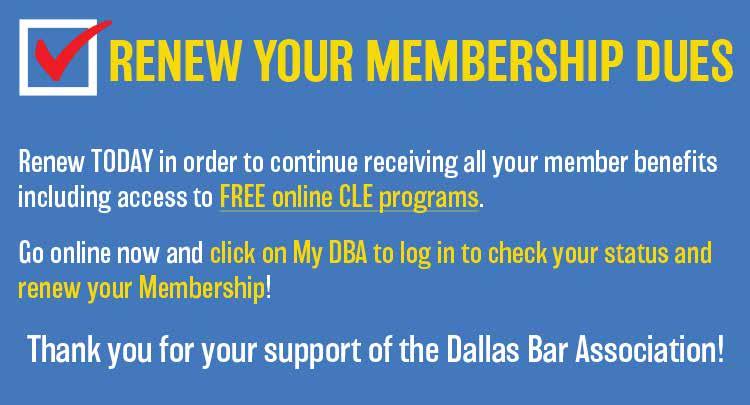
October 2022 Dallas Bar Association l Headnotes 29
Do’s and Don’ts of Opening Statements Focus Tort & Insurance Practice/Trial Skills for estate and wealth management professionals Top Planning Ideas Today: COVID, Congress, Charity PAUL S. LEE , J.D., LL.M. Chief Tax Strategist of The Northern Trust Company The Advisors series Presents November 10, 2022 The Arts District Mansion (formerly known as Belo Mansion) 7:30 a.m. Breakfast 8:00 a.m. Program $90 per person 2 Hours of Continuing Education Credit Pending For more information and to register, call 972.661.9792 or visit www.catholicfoundation.com
KUDOS
Alexis Angell, of Polsinelli, has been appointed as the Chair of the American Health Law Association’s Medical Staff, Credentialing, and Peer Review Practice Group.
Wendi Campbell Rogaliner, of Bradley Arant Boult Cummings LLP, has been elected a Fellow of the American Bar Foundation.
John Browning, of Spencer Fane LLP, has been honored with the American Bar Association’s Silver Gavel Award for Media and the Arts, which recognizes outstanding work that fosters the public’s understanding of law and the legal system.
Judge Irma Carrillo Ramirez, U.S. Mag istrate Judge for the Northern District of Texas, was selected as 2022 “Judge of the Year” by the Hispanic Issues Section (HIS) of the State Bar of Texas.
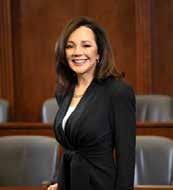
Michele Wong Krause, of Wong Krause & Associates, received the 2020 Global Vision Award from the Greater Dallas Taiwanese Chamber of Commerce.
Quentin Brogdon, of Crain Brogdon, LLP was appointed to the national Execu tive Committee for the American Board of Trial Advocates.
Michelle Hartmann, of Baker McKenzie, has been named Managing Partner of the firm’s Texas offices in Dallas and Houston. Will Woods, of the firm, has been named Chair of the North America Interna tional Commercial Practice Group
John Gessner, of Carrington, Coleman, Sloman & Blumenthal LLP, has been selected to serve as a member of the Texas Alcoholic Beverage Commission’s Public Safety Advisory Committee.

Rachel Riley, of Katten Muchin Rosenman LLP, has been appointed to Partner.
William Mahomes, Jr. has been named a Texas A&M’s 2022 Distinguished Alumni.
Greg Reigel, of Shackelford, Bowen, McKinley & Norton, has been elected President of the Lawyer-Pilots Bar Asso ciation.
John Kappel and David Findley, of Ors inger, Nelson, Downing & Anderson, LLP, have been promoted to Partner.
Chris Krupa Downs, of Krupa Downs Law, PLLC, received the Plano Cham ber’s Athena Award which honors an exceptional woman who has achieved excellence in her professional and per sonal life.
ON THE MOVE
Kyle Owens and Lauren Smyth joined Bradley Arant Boult Cummings LLP as Partners.
Mark Castillo joined Carrington, Coleman,
DBA Living Legends

Sloman & Blumenthal LLP as Partner.
Melissa Winchester joined Vedder Price as Shareholder.
Eric Tautfest joined Munck Wilson Mandala as Partner.
Kerry A. Adams has joined Bell Nun nally as Partner.
G. Michael Gruber, Christina M. Car roll, and Brian E. Mason have joined Greenberg Traurig as Shareholders.
Megan Dixon joined Clouse Brown as an Executive Employment Attorney.
Diana Cochrane Brooks has opened Diana Brooks Law, PLLC at 5900 South Lake Forest. Suite 240, McK inney, Texas 75070. Phone: 972-5164396. Shayla Smith joined the firm as Senior Attorney.
News items regarding current members of the Dallas Bar Association are included in Head notes as space permits. Please send your announcements to Judi Smalling at jsmall ing@dallasbar.org. Dallas, TX 75201-2768. Contact Person: Jessica D. Smith. Telephone: 214-220-7477. (8) Complete Mailing Address of Headquarters or General Business Office of Publisher: 2101 Ross Ave., Dallas, TX 75201. (9) Full Name and Complete Mailing Address of Publisher: Dallas Bar Association, 2101 Ross Ave., Dallas, TX 75201. Full Name and Complete Mailing Address of Editor: Jessica D. Smith, Editor, 2101 Ross Ave., Dallas, TX 75201. (10) Owner: Dallas Bar Association, 2101 Ross Ave., Dallas, TX 75201. (11) Known Bondholders, Mortgagees, and Other Security Holders Owning or Holding 1 Percent or More of Total Amount of Bonds, Mortgages, or Other Securities: None. (12) Tax Status: Has Not Changed During Preceding 12 Months. (13) Publication Title: Headnotes. (14) Issue Date for Circulation Data: September 1, 2022.
(15) Extent and Nature of Circulation. (First number is Average No. Copies Each Issue During Preceding 12 Months; Second number is No. Copies of Single Issue Pu blished Nearest to Filing Date). (15a) Total Number of Copies (net press run): 11,846; 18,590. (15b1) Mailed Outside-County Paid Subscriptions Stated on PS Form 3541: 1850; 1,995. (15b2) Mailed In-County Paid Subscriptions Stated on PS Form 3541: 8,553; 8,830. (15b3) Paid Distribution Outside the Mails Including Sales Through Dealers and Carriers, Street Vendors, Counter Sales, and Other Paid Distribution Outside USPS: 0; 0. (15b4) Paid Distribution by Other Classes of Mail Through the USPS: 0; 0. (15c) Total Paid Distribution: 10,403; 10,825. (15d1) Free or Nominal Rate OutsideCounty Copies Included on PS Form 3541: 181; 686. (15d2) Free or Nominal Rate In-County Copies Included on PS Form 3541: 1,211; 7,042. (15d3) Free or Nominal Rate Copies Mailed at Other Classes Through the USPS: 12; 6 (15d4) Free or Nominal Rate Distribution Outside the Mail: 5; 20. (15e) Total Free or Nominal Rate Distribution: 1,409; 7,754. (15f) Total Distribution: 11,812; 18,579. (15g) Copies not Distributed: 34; 44 (15h) Total: 11,846; 18,590. (15i) Percent Paid: 88%; 58%.
(16a) Electronic Copy Circulation. 0 (16b) Total Paid Print Copies + Paid Electronic Copies: 10,403; 10,825. (16c) Total Paid Distribution + Paid Electronic Copies: 11,812; 18,579. (16d) Percent Paid: 88%; 58%. (17) Publication of Statement of Ownership. Publication required. Will be printed in the October 1, 2022, issue of this publication. (18) Signature and Title of Editor, Publisher, Business Manager, or Owner: Jessica D. Smith, Editor. Date: August 26, 2022 I certify that all information furnished on this form is true and complete. I understand that anyone who furnishes false or misleading information on this form or who omits material or information requested on the form may be subject to criminal sanctions (including fines and imprisonment) and/or civil sanctions (including civil penalties).
 On September 15 the DBA presented a DBA Living Legends webinar featuring Hon. Irma Carrillo Ramirez, U.S. District Court Northern District, Magistrate Judge, interviewed by Javier Perez, Perez Law. The program was co-hosted by the DBA Allied Bars Equality Committee and the Dallas Hispanic Bar Association in honor of National Hispanic Heritage Month. Find all the Living Legends videos on our YouTube Channel at https://buff.ly/3FwEmN3.
On September 15 the DBA presented a DBA Living Legends webinar featuring Hon. Irma Carrillo Ramirez, U.S. District Court Northern District, Magistrate Judge, interviewed by Javier Perez, Perez Law. The program was co-hosted by the DBA Allied Bars Equality Committee and the Dallas Hispanic Bar Association in honor of National Hispanic Heritage Month. Find all the Living Legends videos on our YouTube Channel at https://buff.ly/3FwEmN3.
30 Headnotes l Dallas Bar Association October 2022
In The News The Dallas Bar Foundation announces the Twenty-Ninth Fellows Luncheon honoring 2022 Fellows Justinian Award Recipient Hon. Karen Gren Scholer U.S. District Judge, Northern District of Texas Life Benefactor Fellow, Dallas Bar Foundation 214.220.7487 (1) Publication Title: Headnotes. (2) Publication Number: 1057-0144. (3) Filing Date: August 26, 2022. (4) Issue Frequency: Monthly. (5) Number of Issues Published An nually: 12. (6) Annual Subscription Price: $30. (7) Complete Mailing Address of Known Office of Publication: 2101 Ross Ave.,
Focus Tort & Insurance Practice/Trial Skills
Venue and Removal: Don’t Trust—Verify
BY DREW THOMAS
Imagine you are given a new case. You receive an email from a partner asking you to prepare an answer—per haps a general denial. Or at a plain tiff firm, your partner asks you to file a lawsuit in a specific venue. Should you blindly follow these instructions? What if there are greener pastures—either an escape hatch from a bad venue on the defense side, or a more favorable venue available on the plaintiff side? Follow the steps below to impress your firm and your clients.
Step 1
Do I like my current venue (or can I hold onto it)? If yes, set this article aside for a rainy day. But maybe, you dislike the jury pool, lack experience with the judge, or there are just too many other unknowns. If so, proceed to step 2.
Step 2
Know the rules that will help you get to a better place. A few unusual ones are below.
Removal to Federal Court
• Diversity Jurisdiction of LLCs Assumption : The defendant is a Texas LLC, so there is no diversity of citizenship.
Verdict : Not necessarily. For pur poses of diversity jurisdiction, “the citi zenship of an LLC is determined by the citizenship of all of its members.” Har
vey v. Grey Wolf Drilling Co. , 542 F.3d 1077, 1080 (5th Cir. 2008).
Opportunity : Are any members of the Texas LLC citizens of other states? If so, the case may be removable.
• Fraudulent Joinder of Parties and Claims
Assumption : There is a forum defendant or non-removable claim, so state court it is.
Verdict : Only sometimes.
Opportunity : If there is there no possibility of recovery against the forum defendant or on the non-remov able claim, the case may be removable. For instance, if a holding company is sued, fraudulent joinder may apply. For non-removable claims, in Rawls v. Old Republic Gen. Ins. Group, Inc. , the otherwise non-removable worker’s com pensation claim was not viable due to the plaintiff’s failure to exhaust admin istrative remedies. 489 F. Supp. 3d 646, 653 (S.D. Tex. 2020). Thus, the case was removable.
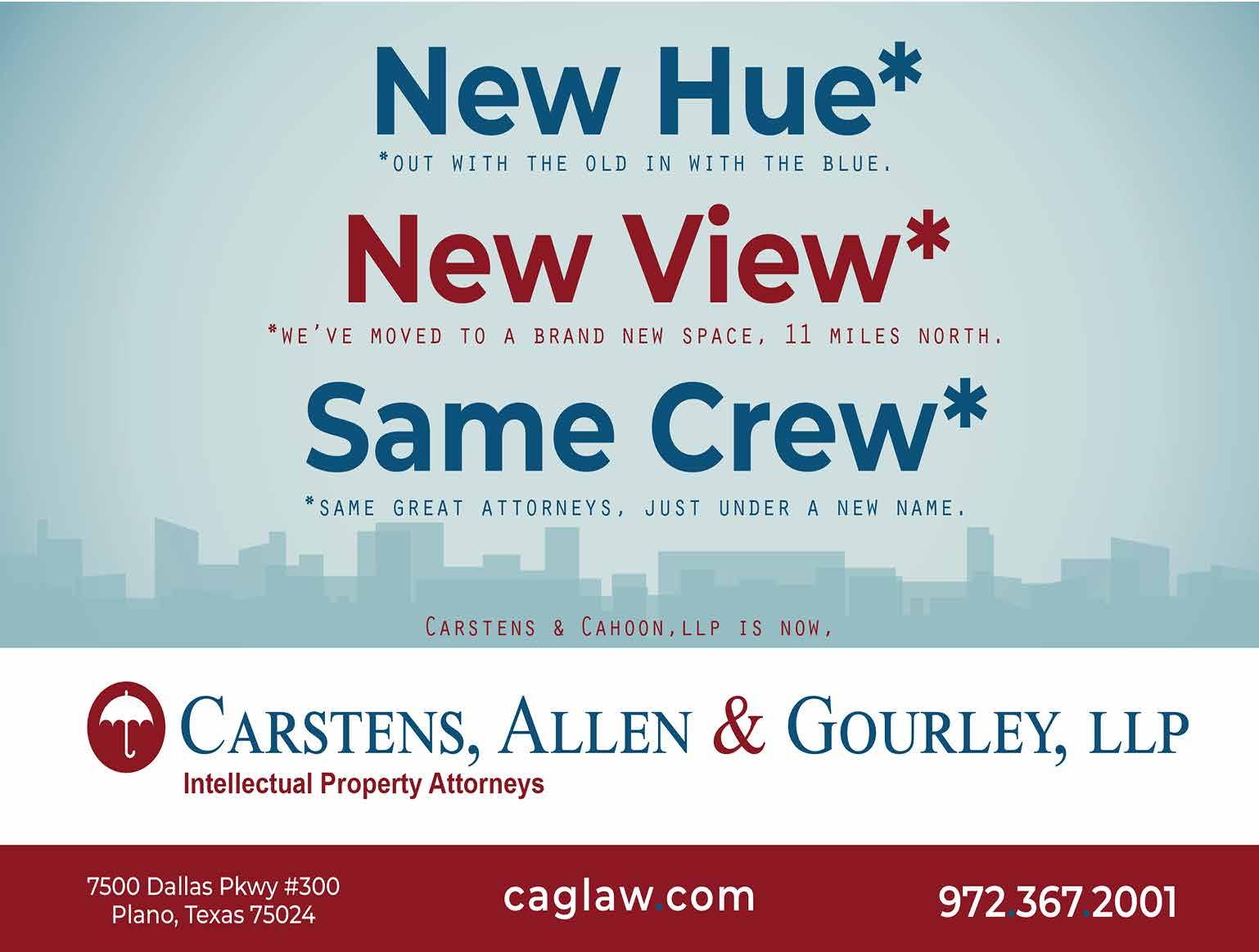
Bad Faith
• Assumption : I cannot remove after one year.
Verdict : Not true if there is bad faith.
Opportunity : Did the plaintiff state in the petition that she seeks less than $75,000 ( see Espinoza v. Allstate Tex. Lloyd’s , 222 F. Supp. 3d 529, 536 (W.D. Tex. 2016))? Did the plaintiff sue a forum defendant to prevent removal ( see Keller Logistics Grp., Inc. v. Navis tar, Inc. , 391 F. Supp. 3d 774, 780 (N.D. Ohio 2019))? The plaintiff’s bad faith may allow for removal after one year.
In Keller , a federal judge found such bad faith where there was evidence of a scheme that plaintiffs sued non-diverse truck dealers to destroy diversity juris diction.
Snap Removals
• Assumption : There is a forum defendant, so we are stuck in state court.
Verdict : Not true in at least one rare situation.
Opportunity : Is there a foreign plaintiff, foreign defendant, and an unserved forum defendant? If so, the foreign defendant can remove the case before the forum defendant is served. Tex. Brine Co., L.L.C. v. Am. Arbitra tion Ass’n, Inc. , 955 F.3d 482, 487 (5th Cir. 2020). Timing is everything with this one.
Venue in Texas State Courts
• Fraudulent Joinder of Parties
Assumption : The defendant resides in the county of suit, so we are trapped there.
Verdict : Not always.
Opportunity : Fraudulent joinder of parties to establish venue should not defeat a motion to transfer venue. In a case handled by my firm, a plain tiff sued two defendants, but allowed one defendant to remain in default for seven months. The court granted the non-defaulting defendant’s motion to transfer venue because it determined that the plaintiff had no intention of pursuing the defaulting defendant to judgment. See Garza v. State and
County Mutual Fire Insur. Co. , 2007 WL 1168468 (Tex. App.—Fort Worth 2007, no pet.) (mem. op.).
• Change of Principal Office
Assumption : The defendant has its principal office in this county, so we are stuck there.
Verdict : Maybe, but maybe not.
Opportunity : Did the defendant move recently? Where was the princi pal office when the facts giving rise to the cause of action accrued? See Tex. Civ. Prac. & Rem. Code § 15.006. If the defendant’s principal office was in a more favorable venue when the cause of action arose, you may wish to move to transfer (or file there to begin with).
• Offices in Multiple Counties
Assumption : The defendant’s city is in this county, so we are stuck.
Verdict : Not every time.
Opportunity : Is the city one of the 46 Texas cities that are situated in multiple counties? In one of my cases, a plaintiff sued several defendants in Dallas County, one residing in Grand Prairie. But Grand Prairie is located partially in Dallas and partially in Tarrant County, the defendant’s true home. Hours before the motion to transfer hearing, the plaintiff nonsuited our client only. No other defen dant challenged venue.
Step 3
Enjoy better outcomes for your cli ents. And good luck! HN
Drew Thomas is an Associate at Hartline Barger LLP. He may be reached at dthomas@hartlinebarger.com
October 2022 Dallas Bar Association l Headnotes 31
32 Headnotes l Dallas Bar Association October 2022
